#very important additional context is that I’m not Jewish
Text
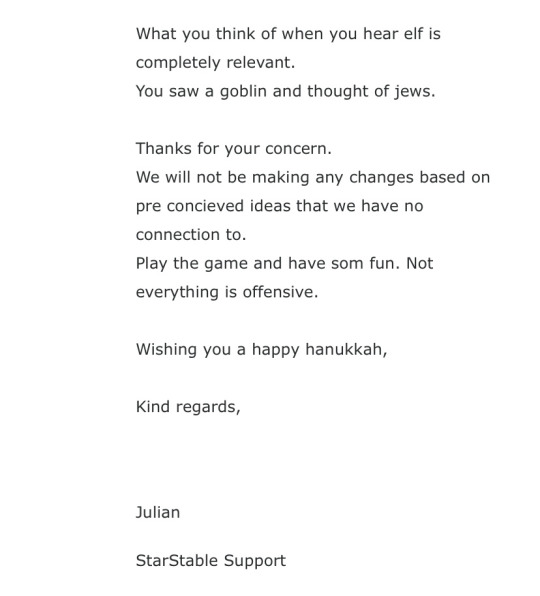
This is the full email I was sent, I just cut out the greeting cause it had my email in it. You ever just. Get real tired.
For context here’s the response I sent after his last email.
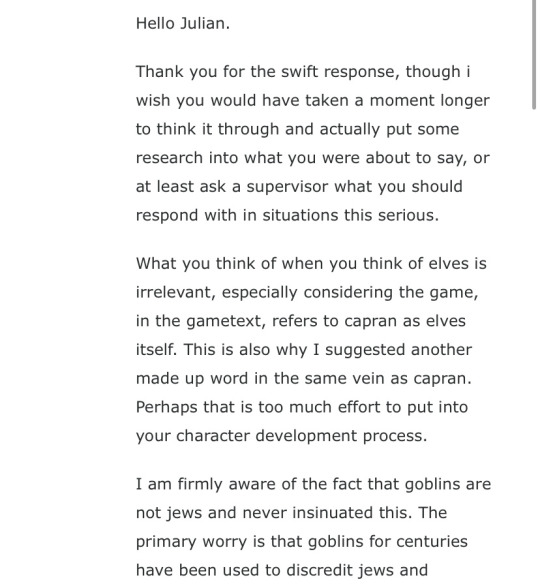
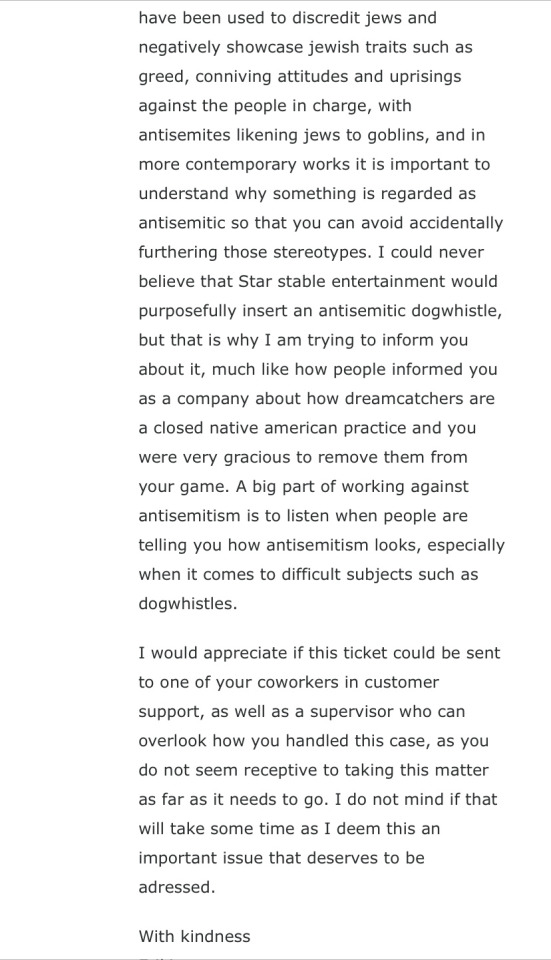
#sso#ssoblr#very important additional context is that I’m not Jewish#but the fact that he thinks I was and still decided to ignore who he thought was a Jew talking about antisemitism is fucking disgusting#I hate this company and it’s employees I am no longer caring about any of them#except ismael. ismael is still chill.
68 notes
·
View notes
Text
Buddie 602 meta
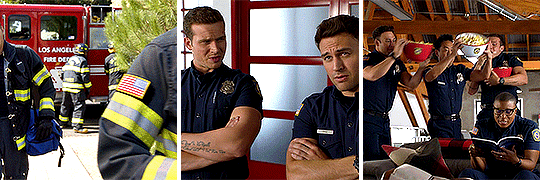
I mentioned with this gif that Buck and Eddie really were more than battlefield boyfriends in this ep, they were work husbands. Yes, they did their thing where they turned around in sync shortly after they arrived at the “lust tunnel” call, but even after they were back at the station, they observed a sleeping Hen together, somewhere between worried about her and poking fun at her. See, the show could have had Chim there for this bit as well. It did have him there when the guys later spill popcorn over Hen. But no, we get a tiny reminder that the only ones who are truly attached at the hip, who naturally turn to each other, who choose to be that joined together every chance they get, on and off the field, are Buck and Eddie. ~ ~
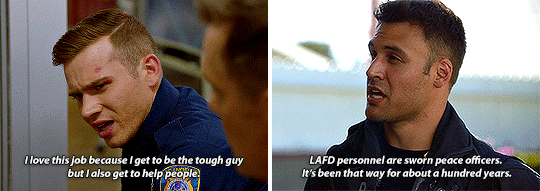
Remember back in ep 102, Buck talked about how, unlike with the Navy SEALS, what he loved about being a firefighter is that he got to be the tough guy, but also to help people (without becoming a machine)? I was hit by how much this parallels Eddie, who also had emotional issues due to his service in the army, but on calls like the “love tunnel” one, he still gets to be the tough guy, binding the hands of an attempted murderer, while serving as a peace officer. I just love how much the show stresses that Buddie will always get each other better than anyone else will, because they’re just so similar when it comes to the most important things in life in terms of who they are and what they need. They’re essentially made for each other. ~ ~

Buck resorting to a self help book reminded me of him in 406, reading about the different love languages. I thought it was an interesting link (even visually) to remind us that while his journey is leading him to currently choose being single, it is ultimately connected to his desire for romantic love as well. Not because every self-discovery search has to, but we’re reminded that for him personally, that’s something that he deeply craves. His journey will be complete when in addition to himself, he’ll find and get to enjoy this love that he’s been dreaming of for so long. ~ ~
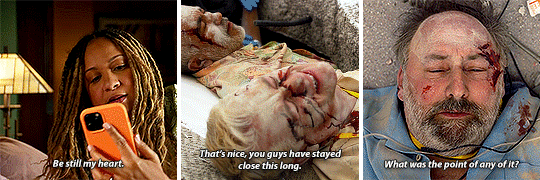
Allow me to go wild (and geeky) for a second. The guy that they treat (and fail to save) at the happiness convention? His name is Lev. I might have mentioned in the past that I’m a name geek (I even once contemplated making a resource post for fans and creators in the 911 fandom about the meaning and origin of characters’ names on the show), so right away, my ears pricked up. I know that it’s revealed the patient’s name is ‘Nathan Levinson.’ But it’s a late reveal, towards the very end of the ep. For most of that call, they refer to him as ‘Lev,’ which is actually a first name as well. It has two possible meanings, depending on its origin. One is that it comes from Russian and means lion. Which might be a play on the name of the actor portraying Lev. He’s called Arye, and his name in Hebrew means lion. If this is what the show was going for, it would be pretty cool, and it would def indicate that they pay attention to an actor’s real life background. But then consider the other option. ‘Lev’ is also a Hebrew name, which means ‘heart.’ Arye Gross, the character’s actor, is Jewish himself, and ‘Levinson’ is a Jewish last name, which seems to suggest that the Hebrew interpretation for Lev’s name is the right one. This would mean that the patient who Buck related so deeply to and who Eddie noticed was really close for a very long time with his friends - they’re all literally call him ‘heart.’ To top that all off, playing on the meaning of the word heart in a romantic context is brought up in this very ep, between Hen and Karen. So when we add all that to the fact that, as I’ve mentioned in previous weekly meta posts, we have had an ongoing heart theme with Buck and Eddie for a while now, you hopefully get why I feel there’s significance to this name choice. ~ ~
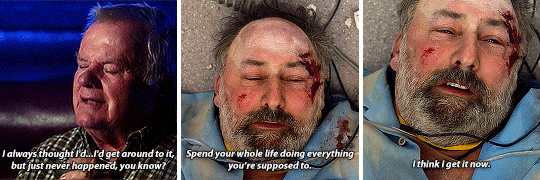
Lev obviously is meant to be another Red (from ep 316) for Buck. Unlike Red, Lev’s not a firefighter, he’s “just” a patient they lost, but because of where Buck is at this moment in his life, the encounter’s enough to shake him up. Just like Red basically came along and showed Buck that work isn’t everything, and that it doesn’t matter how much you give it your all, you still might end up lonely, Lev showed him that in every walk of “normative” life (career, wife, kids, possessions) you might do the same and still end up sad. Obviously, this is going to leave Buck feeling like he needs to try out new things, find a new direction that might lead him to that being at ease and happy that he’s been looking for (especially as the people he usually looks up to for answers can’t provide them right now: Bobby’s away dealing with his own family crisis, while Hen is a little lost herself). But I find it interesting, ‘coz this ep actually gave us an indication of what Lev might have ended up with. He doesn’t figure out the meaning to life and happiness when he’s injured, or during the following talk. He appears to find it after he chooses to make a sacrifice in order to save another person’s life and learns that was successful. I just find it very curious that at the end of the day, it’s implied the answer he found is what Buck already has, saving others. So I suspect (sorry to be drifting a bit into speculation territory) that this is the conclusion that Buck will eventually get to as well, that he’s had what he needs to be happy all along. And if you remember my meta for 601, that seemed to be the implied conclusion there as well, with the moving of the armchair. That Buck will eventually realize what makes him happiest, is what he already has, he just needs to redefine things a little. So all of this together feels like it’s further strengthening the idea that eventually, as part of his quest for self-realization and happiness, Buck is also going to figure out he already has the love he’s been searching for... ~ ~
Thank you so much for reading and for any and all support, like unbelievably kind tags in reblogs! Thank you also for the amazing gifs to the incredible @whosoldherout, who just knocks it outta the park. You can also find more of my Buddie fics, gifs and meta, if you’re interested. Thank you again! xoxox
#buddie#911meta#buddie meta#911 meta#9-1-1#evan buckley#eddie diaz#buddie gif#buddie gifs#buddieedit#911edit#911 gif#911gif#911gifs#911 gifs#wm#911onabc#911 on abc#911abc#911 abc
485 notes
·
View notes
Note
I think your interpretation of that scene is skewed and contributed to what happened. Whether or not the specific term “man crush” had been invented by the time of that scene, what David and Gary are discussing is bisexuality. Bisexuality has been around longer than we’ve had the words to talk about it and certainly much before either Gary or David’s times. My understanding of “the humor” in that scene is that David is describing the feelings of being attracted to a woman and comparing them to the same feelings he has towards Gary, thus verbally contradicting himself. It’s funny because while David is saying he’s NOT gay, he is describing himself BEING gay. (Re bisexual due to his history and admittance to wanting/liking/desiring women as well).
No matter the intent of the skit, the impact is a discussion of bisexuality.
Your response to the other person denies and rejects the duality of intent and impact and leans heavily on the insistence that only the intent is valid. Which is where I see the disconnect. (And how the hell do you know David and Gary’s initial intent with this scene?). If you speak with such authority, you need to give that same authority back to those in the same position as you. Neither of you were there in the making of that skit and both of your responses lay on the same level of assumption.
As someone who has faced continuous denial and rejection of my existence and identities, being cast away with words of “it’s just funny to me” is not funny to me and does more harm than good. It’s especially difficult to have discussions and back and forths online because you lose a lot of nuance and tone indicators when reading in your own voice and from your own perspective. I’m sure your impact of this anon will differ from my intent in sending it.
I’m interjecting my voice and my opinion on the matter because your “call-out” post made this all public and indicated that some sort of external input was needed or desired. You seem to be trying to understand what’s happening and without personally speaking to either of you or having any additional context out of seeing your post on my dash and clicking the links (seeing those posts for the very first time too) i understand how much it sucks to feel misinterpreted and wish you peace in whatever level of understanding you are left with.
Tagging this as "drama" (shorter than misconceptions) for anyone that wants to avoid.
Referring to this post.
Well, I only "know" because David has repeatedly said in all his interviews about the topic that the skit was about a "man crush" before the term existed, not about gay or bisexuality. I'm just repeating what he's said--reference (2:37 onward is the specific backstory.) It's funny either way; the original intent just tickled my funny bone more.
I'm fine that anyone can interpret it differently-- that's comedy-- but that doesn't give someone the right to paint me as a bigot for not agreeing with one interpretation, just as it wouldn't give me the right to lambast jewish-mulder for her own take on that skit.
And let's say you're 100% correct and I'm 100% wrong... am I a bigot because I accidentally hurt or minimized your or Anna's personal experiences? The intent is important: why was I brushed with the same brush as an actual bigot and dismissed so quickly without being given the chance to correct if I'd offended?
Thank you for taking the time to drop in with your thoughts. I appreciate it; and hope you have a lovely day.
#asks#anon#the misunderstanding topic#important#txf#fandom#DD#Gary Shandling#thank you for taking the time#drama#not really but for those who don't want to read#jewish-mulder#BananaChef
3 notes
·
View notes
Note
im all here for jewish bruce so please dont take this as me disagreeing with you or anything because canon doesnt even matter in the first place and mostly im just a little confused but if kate is bruce's cousin from his moms side and being jewish comes from your mom doesnt that mean kates mom is jewish and it doesnt have anything to do w. her dad who would be the kane part of the equation unlesd her dad is also jewish idk i dont really go here im just creeping on the sidelines rn yanno
Sure! Anon, this is a question that comes up a lot, and I’m not expert, but here’s what I know:
-Martha Kane and Jacob Kane were siblings
-The Kanes are established as Jewish in canon (including Jacob)
-Kate is Jewish, which, according to halachic interpretation, assumes that her mother was Jewish at the bare minimum (but that her father likely was Jewish as well)
-Martha, being Jacob’s sister, would also be Jewish (barring a weird half-brother situation, or that he converted at some point)
-The above exceptions would be unlikely considering the Jewishness of the Kane name, “Jacob”, etc.
-At the bare minimum again, since Judaism is technically matrilineal (more about this later) and the Kane family line is Jewish, any of Martha’s children would also be Jewish
-Bruce Wayne would halachically be Jewish
Now, all of this hinges on Jacob Kane being Jewish by birth and the Kane family being Jewish overall. But there are also some additional clues:
-Kate’s family was intentionally made Jewish, in a nod to Jewish creator Bob Kane, whose family was also Jewish
-Martha and Jacob’s generation usually married within Judaism by tradition (this has changed a lot in the last few decades) and marriage into another faith was generally frowned upon.
-The above makes it unlikely Jacob married into a Jewish family unintentionally (i.e., Kate’s mother being Jewish was important to Jacob as a Jewish man)
-Jacob is a commonly-given name to Jewish men
-Martha marrying outside the faith would explain why Bruce was not necessarily raised Jewish (in this retcon, at least)
Hey? Everyone keeps arguing about matrilineal Judaism. What does that even mean?
-This comes up a lot in Jewish Batman discourse. Matrilineal Judaism is a remnant of Biblical times, where Judaism could only be confirmed if the mother was Jewish (assuming the father was not present, etc)
-Certain sections of Judaism hold this strongly, including Conservative, Orthodox, Reform (to an extent) and some other traditions
-For a long time, and still somewhat to this day, it was frowned upon to marry a non-Jewish man (i.e., Jews tended to marry Jews)
-Patrilineal Judaism (Judaism passed down by the father) is slowly being more accepted, as well as other discrepancies (adoption, Jewish grandparent, etc)
-Some traditions still don’t necessarily view someone as Jewish unless they practice Judaism (had a bar mitzvah, converted, etc) but this is rare, largely because of the “one drop” rule in the Holocaust, and modern aliyah standards of Israel.
-When folks in the fandom talk about Batman in the context of matrilineal Judaism, they’re usually referring to the fact that, if Martha Kane was Jewish in any way when she had Bruce, he would technically be Jewish by birth in the eyes of many rabbis, regardless of his own practiced religion or atheism.
-Like I said earlier, all of this hinges on if Jacob Kane was Jewish by birth. I.e., that Martha and Jacob’s mother was Jewish.
I believe that canon has been established enough where we can assume that Jacob Kane was in fact Jewish by birth, that he married a Jewish woman, and had a Jewish child (Kate).
I don’t believe this retcon intentionally made Bruce Jewish. Again, some would argue that he’s not really Jewish, as he’s never practiced or recognized the religion in canon.
However, Judaism is tricky. It’s an ethnic group, a religion, and a cultural tradition, all amassed into one messy blob. It’s likely, if Martha was raised Jewish, that there were still some vestiges of Jewish cultural practices in how she raised Bruce (celebrating some holidays, traditions, or observances) unless she explicitly chose to ignore them.
All in all, I would say it is very likely that Bruce is technically Jewish. More likely than not. An accident? Yes. But a good one for all of us Jewish fans.
#more on how jewish views on justice are reflected in batman's no killing rule later#jewish batman#jewish bruce wayne#ask#anon#wow i really just wrote all of that#bruce wayne#batman#martha wayne#kate kane#batwoman#batfamily#judaism#halachic hell#i am a confused jew and don't take my word for it#this is all i can offer#would love to hear what other Jewish fans think
895 notes
·
View notes
Note
do you think there is any significance that alex's colour scheme is green and pink? or do you think rr went "u know what this character needs? to look like a watermelon"
((Prefacing this by saying that I'm giving RR way too much credit here, but you shouldn't take anything an author does for granted— even a serial author who often makes blunders and mistakes.))
A while ago I saw a (pretty unfair) assumption that RR made it green and pink because blue and pink would be too obvious, but that his intention was obviously to reinforce the gender binary by using two distinctly gendered colors for a character with two distinct genders. Of course, they did not phrase it so delicately. No offense to whoever made that post, but I disagree.
Although that may have had to do with it, there's other things to consider. One of them is color symbolism. And oh. OH. I ADORE symbolism— especially flower/plant symbolism (Language of the Flowers and all that jazz), seasonal symbolism (there's a reason that evermore is my second favorite Taylor Swift album), and color symbolism.
GREEN
Let's talk about green first. Green can symbolize a lot of different things, and there are a few that can be applied to Alex's character. The most obvious thing that green often represents is jealousy— hence the expression "green with envy." But envy is not really one of Alex's character traits. Feel free to argue with me if you think that Alex is significantly envious. Just because I couldn't think of substantial textual evidence for it does not mean that there isn't any.
One of the traits that Alex does have is wealth. Green is the color of American currency, and since both RR and Alex are American, it's safe to take an American lens while looking at this color. Alex's socioeconomic background effects her in a big way. I mentioned in a previous post that I think that Alex's fatal flaw is her sense of entitlement. That kind of entitlement is a quality not exclusive to but common among the upper class. However, her distance from her wealthy background enhances the sense of irony in the story, which is a VERY big thing that we NEVER talk about within the fandom.
This is kind of a little thing, but it's worth noting that when it comes to Valhalla and everything, Alex is "green"— as in new and inexperienced.
The color green also emphasizes Alex's connection with nature. This is one of the parts of Alex's character that the fandom consistently underplays, which is an absolute shame. I don't think I have to explain why the color green is associated with all things natural. Alex's association with nature provides a few key things to her character:
It makes her a more well-rounded character. Another criticism of Alex I believe is totally unfounded is that "being genderfluid is her only personality trait because it influences her philosophy on pottery, which is her only hobby." I'm probably going to make another post in, like, a few minutes about why I find that argument a little silly, but the primary problem is that pottery is not Alex's only hobby. She also loves camping, hiking, and ice wall climbing (I bet y'all forgot about that last one!)
It gives her a connection with Magnus. I mentioned in a previous post that Magnus and Alex are foils, but I neglected to bring up why that also makes for very good chemistry between them. Of course, yes, they have different goals and philosophy, which is what makes them foils in the first place. But foil relationships function best when the characters also share some traits. As it turns out, Alex and Magnus share several hobbies, and one of them is a mutual love for nature. This is a very unexplored thing in fics. Start doing it more plz.
Finally, and this one's kind of minor, but the Alex's green gives her a connection to Natalie. I know, whenever Alex and Natalie are compared, either in canon or in fandom, everybody kind goes "eww. Oedipus complex." Which is very fair and true. But they really do have a lot of similarites. The green of Alex's hair and clothes connects her to the green of Natalie's eyes. It's worth saying, too, that Alex has one amber eye— and amber is pretty close to dirty blonde, like Natalie's hair.
If I had more faith in RR, I might bring up the concept of intextuality and how Alex wearing green is an allusion to The Great Gatsby and how Alex is elusive to Magnus, just like Daisy is to Gatsby. But I don't.
PINK
To give credit to the person who wrote the post I mentioned at the beginning of this spiel, I do believe that part of the reason pink was used was to support femininity. Please keep in mind that Alex dresses in an androgynous way— not that there is an actually "gendered" way to dress, since gender as we perceive it is mostly made up. But Alex's existence as a transfemme person (which I will maintain until my dying day) means that pink has a certain significance to her. A lot of AMAB people embrace traditionally feminine things because if they don't, they will not be accepted as genuine women or genuine nonbinary folks, since masculine dress is unisex and kind of the default. So Alex wearing pink probably had something to do with her gender, yes. But that's not necessarily a bad thing, and it's certainly not an unrealistic thing.
Speaking of Alex's gender in relation to the color pink, let's talk about pink's use as a queer rights symbol. Alex was RR's first character to be introduced as a queer character from the start. This was not an insignificant thing, especially in the year of our Lord 2016 (which, despite popular belief, seriously had an entirely different landscape of queer rep. Though it's commonplace now to include genderqueer characters, it was exceptional at the time— especially by such an accomplished and mainstream children's author.).
Let's go back in time to Nazi Germany. Some of you might know this, but for those of you don't this transition must seem jarring. I swear there's a point. In addition to Jews, Romani individuals, people with disabilities, and Poles (among others), gay men were victimized by the Nazis. If you're wondering why lesbians weren't persecuted, it's because the Nazis didn't see them as a serious political threat, or as a threat to the perpetuation of the Aryan race since they assumed gay women could be forcefully impregnated if need be. Yeah, ew. Anyway, much like the Star of David being used to mark Jewish people, gay men were forced into concentration camps and forced to wear a pink triangle. Years later, after the gay population somewhat recovered, the pink triangle was reclaimed and used as a symbol for gay men. Some people who were not gay men used it, too, but that's somewhat controversial since it wasn't their symbol to reclaim. When the first pride flag was created, it had a pink stripe at the top to signify sex (this was later dropped so flags could be more easily produced). The pink triangle (inverted) was used during the AIDs epidemic with the caption "Silence=Death."
My point is that this is a very important color to queer folks. Having one of the first genderfluid characters in kid's lit wear pink...... I mean, it makes sense.
The last and final thing that pink represents, in this context and in general, is innocence. Granted, this kind of connects to feminitity since women (especially white women) are often infantalized and seen as innocent— which is another issue. In any case, the use of pink to represent innocence in Alex's dress is ironic. Alex has been robbed of her childhood innocence, first by her abusive parents, then by her life on the streets, and then by her eventual death at age sixteen. But then she actually regains her innocence. At the beginning of the—
Hold on. I just had a revelation. I'll make a post about it soon.
At the beginning of SotD, Alex is acting a little childish. The most obvious example is him jumping on Randolph's bed to "make noise." Alex's life is stable and relatively healthy for the first time in the years, and she experiences something that a lot of queer folks experience: a re-emergence of childhood at a late stage.
I imagine you didn't expect a post this long. I either make essay responses to asks or I add on one sentence and post it. Oops. Anyway, I believe the mcga fandom can be more creative than calling Alex a watermelon. Here are some other (kinda romantic) pink-and-green alternatives:
Roses
Dragonfruit
Grapefruit
Cherry blossom trees
#mcga#magnus chase#alex fierro#mcatgoa#magnus chase and the gods of asgard#sorry for the long response lol#thanks for the ask! I had a go of it!
88 notes
·
View notes
Text
Season Two Episode Two

Following a typically chaotic opener, Episode Two of Season Two strikes a far more sombre tone. The arrival of Henry Lang as Robert’s valet brings the first of this episode’s three plot points that address the impact of WW1 on the mental health of its soldiers. There is nothing funny to say about either shell-shock or suicidal ideation both of which are vast, complex issues that, for my money, Downton Abbey isn’t the vehicle explore in (because they require more time and depth than the pace of the plot in Season Two affords) and it certainly isn’t my place to make light of them in this rather irreverent corner of the internet. So I’m going to have a go at treading a fine line here. Forgive me if I stumble.
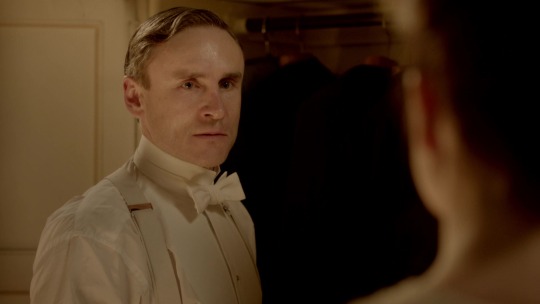
Lang is clearly in the grips of something awful and yet in an attempt to avoid the indignity of having maids in the dining room, he is bumped up to footman duty. He struggles throughout, culminating in him depositing his cargo on Edith’s dress. Mrs O’Brein has firmly taken Lang under her wing, recognising that he is struggling and offers him assurance and comfort that she has never gifted to Thomas.

Across the Village, Lieutenant Edward Courtenay is in the hospital having been blinded by gas. The use of gas (both chlorine and mustard) had a devastating impact on soldiers in WW1 but was also the root of the development of Zyklon B. Frtiz Haber, a German Jewish chemist, enabled chlorine gas to be used a weapon in WW1 and his research was later developed into the Zyklon process which was used by the Nazis to murder millions, including his own family. This is only one of a dizzying number of appalling ironies to be found in the World Wars but as I said last episode, I’m not a military historian so I’m going to leave it there. Edward had plans to return to the country after his graduation from Oxford to pursue the simple life (although one gets the feeling that his idea of the pursuit of a simple life will still be one that is very well upholstered). Thomas has taken it upon himself to read Edward’s letters to him and together with Sybil is helping him to adjust to living life with a different set of parameters. But growing pressure on the hospital’s limited capacity means that he is to be transferred elsewhere. All three voice their dissent at varying volumes to Major Clarkson who falls back on the very real backlog of wounded men. After Edward has died, Major Clarkson, Isobel and Sybil talk about a renewed need for the Abbey to become a convalescent home, an idea that has been bubbling under the surface for a while now. Meanwhile, Thomas has been left on his own to process both Edward’s death and the implications of witnessing a lack of support given by his own physician to those with depression.
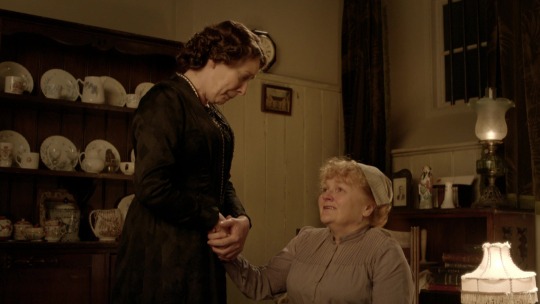
The usually reliably jovial Mrs Patmore also has a more somber episode with her pursuit for the truth about the death of her nephew Archie. Robert finds that he has been shot for cowardice. Not only does this mean that her family is in mourning but they will now have to navigate the stigma and undue shame that came with having a relative die in this way. So entrenched in British life was the derision levelled at those who were shot for cowardice or desertion that it was only in 2006 that pardons were offered by Britain for 309 of those that were executed by firing squad during WW1. I know I said I’d leave it there with the military history, but that felt like an important bit of context.

We are now in 1917 and Matthew is still in the same trench that he was in 1916 (a detail I hadn’t actually noticed until I got the screen cap for this) so it looks like his strategy of downing tools mid-fight and continuously popping back to Blighty for important plot developments isn’t really paying dividends. Perhaps the addition of William to the ranks will help him? William certainly seems to think so and if the speed at which he moves through the various stages of his ‘relationship’ with Daisy is any indication of his tactical prowess, the British Front will not only be well within Germany’s borders but will be breathing down Russia’s neck in a fortnight. In any other episode, this would certainly get the award for oddest relationship dynamic but Sir Richard Carlisle exists.
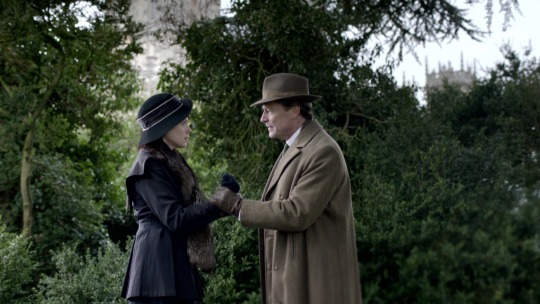
Sir Richard makes his debut at Downton, having been introduced in name only in the previous episode. He and Mary met at Cliveden which is a regular haunt of mine, giving me hope that one day I too will from a strategic alliance with a newspaper magnate. He may know how to talk his way around a boardroom but he is lacking in the sartorial department. Whilst Sir Richard manages to avoid catching fire in his tweed, Lavinia is not free from the heat as he threatens her with his connection to her uncle. He may not know much about navigating the niceties of Downton, but at least he has cottoned on to the fact that any major disagreement should occur under a specific tree. Whilst Mary’s signature move is weeping into her gloves, Sir Richard’s is grabbing women by the forearm. A female friend of mine told me that one of her favourite things about the pandemic and the compulsion to keep 2m away from anyone (and not just emotionally) is that she has not been ’steered’ by a male hand on her lower back since 2019. It turns out that she can enter and exit rooms just fine on her own and I get the impression that Lavinia could get the gist of Sir Richard’s rage without the vice like grip of a man probably about twice her age.

Twinned with the ’tree of emotional conflict’, the ‘platform of romantic uncertainty’ provides the backdrop for Sir Richard’s proposal of marriage to Mary which is a declaration that really feels like it should come with a series of well-formatted charts. Mary’s heart, however, is still very much with Cousin Matthew. After being counselled by Carson in a type of conversation I cannot imagine her ever having with her father, she is on the verge of coming clean with Matthew. But in the second round of Lavinia vs. Mary, Lavinia declares that she ‘could not go on living’ without Matthew and Mary winds her neck in.
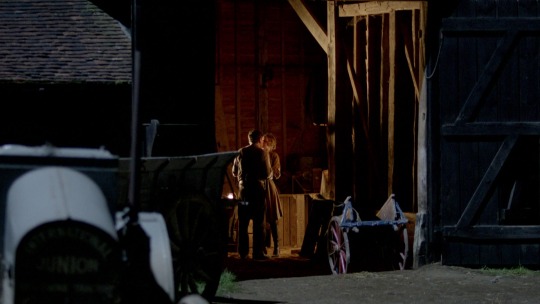
Also having a romantic entanglement this episode is Edith. Drake, previously of dropsy fame, has lost his farm hands and Edith turns up to offer her help in a wildly unsuitable trouser and heeled boot combo. But she soon gets down to it by pulling up a tree stump and flirting in a barn whilst a rather lovely border collie looks on (I’m currently trying to talk myself out of getting a border collie and this incident has done nothing to help things). After showing Drake that she can drink from a bottle like literally every single other human on the planet, the two share a kiss and some highly awkward dialogue that only slightly resembles ‘Carry on Downton’.
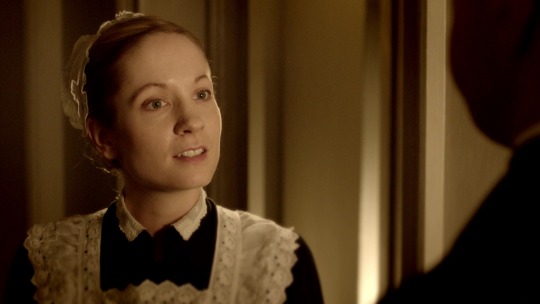
Whilst Edith is more than happy to crack on in a barn, Mr Molesley is much more backwards about coming forwards. Apparently having predicted the creation of ‘The Guernsey Literary and Potato Peel Pie Society’, he figures that a book is the perfect kindling for romance when you exist in a glossy depiction of the past. Sadly neither Elizabeth nor her German garden can lure Anna from Bates who is fast shaping up to be schrodinger’s boyfriend. Anna proceeds to make some odd analogy where she compares Mr Bates to her moon-based child, revealing a rather unhealthy amount of codependency in that particular relationship.
Romantic declaration of the moment
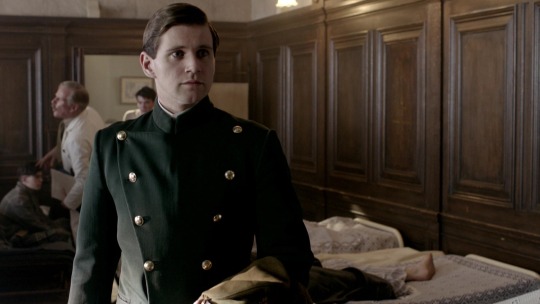
Again, it feels like anyone but Sybil and Branson should get this but I am an agent of chaos and here we are. Branson defends Sybil’s will to work and has ample opportunity to see her shine in her chosen field. The admission that she will not be returning to her old life is a little chink of light that Branson basks in.
Expressive eyebrow of the week
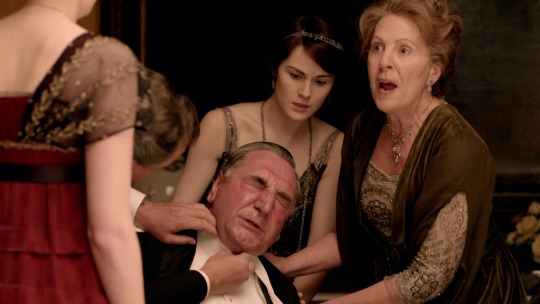
I nominate Carson’s entire face when he realises that he has taken on too much and goes an impressive shade of red. As Carson frets about spoons, sauce, and something I can’t quite fathom, he starts to resemble a man who is re-arranging the deckchairs on the Titanic. Carson’s battle to get a cork out of a bottle and knocking into chairs is a warm up to his rather dramatic collapse which is accompanied by a pretty disturbing groan. Sybil springs to action and he is soon efficiently ensconced in his own quarters.
Wait, what?
“I got a lot done on the train” Clearly Richard was on a train that was unencumbered with the wifi issues that plague the Pendolino.
“It takes a good deal more than that to shock me.” Mary’s shock-o-meter is a pretty odd instrument. It is unresponsive to corpses of diplomats but goes into absolute meltdown at the notion that she might have to live in a cottage.
“Let's hope my reputation will survive it.” I’ve not checked (and I categorically never will) but I would put money on the fact that someone has created a rarepair out of this.
“How can Matthew have chosen that little blonde piece?” Is Lavinia blonde? Women’s hair is not really my forte but I would have thought she was more akin to Tim Minchin than 1998 Justin Timberlake.
“I believe in this war. I believe in what we are fighting for.” William seems to have a better grip on what all of this is about than I ever did in high school history. The ‘A’ that eluded me is heading his way.
“I thought he might've died for love of you.” How I love snipey Thomas. It’s good to have him back. To borrow a quote from Bottas (another man who is currently living a life in which his destiny is his own demise) ‘traditions’.

“Fold it in, don’t slap it” The more season two goes on, the more I think that Moira is just an amalgamation of some choice elements of Julian’s kingdom.
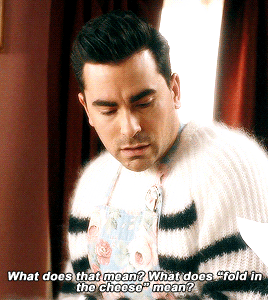
#downton abbey#Downton#downton rewatch#Downton movie#downton abbey movie#thomas barrow#tom branson#edward courtenay#sybil branson#Mary Crawley#lady mary#Matthew Crawley#lavinia swire#Charles Carson#edith crawley#elsie hughes#Mrs Patmore#daisy mason#william mason#anna bates#john bates
82 notes
·
View notes
Note
was wondering if you could elaborate on the aspects/implications you were mainly thinking of/focusing on in that Ibn Ezra commentary that you linked? I found the whole thing very delighting but in a way I wasn’t feeling confident on explaining, and someone i excitedly sent it to didn’t get it at all, just ‘so moses was allowed to say the name but not others?’ (a goy yes)
lmao! but yeah! (this is the post for anyone wondering) and this isn’t ‘a jewish interpretation that Is Known’ or whatever, just me. but the parts i was most delighting about were:
the part where ibn ezra says of G-d’s name, “the meaning of “and this is My name” is the same thing as “this is My memorial””. This is in further context: the name Ehyeh/EHYH has same root as the Tetragrammaton (which is newly introduced in this same scene for the first time in the Torah): that root is “I AM”. But as Ibn Ezra likes emphasizing here as important (is it? eh probably. not conclusive.) Ehyeh is in the first person and the Tetragrammaton is in the 3rd person.
The great complexity and significance of ‘ehyeh asher ‘ehyeh and the reason it’s so analyzed and argued over in judaism is that it’s simple but hard to pin down exactly: it means “I Am That I Am” OR “I Am Who I Am” OR “I Will Be What I Will Be” OR “I create whatever I create” OR “I am the Existing One.” There is time-collapsing and being-collapsing, cause-collapsing and action-collapsing. that/who/I am/will be/I exist/I create/I will exist/I will create/This is My memorial/this is My name.....these are all the exact same Event Or Concept Or Qualia or Statement when it comes to G-d. And this is in context: the Tetragrammaton (I AM but especially implying that it can be/is to be said by another person, aka by someone other than G-d) simultaneously being the Name that is holiest of all and not to be spoken.
The closest idea (in my opinion) is that G-d’s name IS G-d’s being, G-d’s soul: simultaneously: the Tetragrammaton, unlike Ehyeh, is not a first person form of the I AM root. It’s perhaps, the implication of another life naming G-d’s soul into a memorial of existing. A great power.
Then this ties in: Ibn Ezra claims: Moses enunciated the Tetragrammaton (instead of using a different name, instead of pseudopronouncing/mispronouncing the Name as ‘Adonai’), he was ‘holy.‘ Later generations did not say the name, they were less holy. This is Ibn Ezra’s interpretation of exodus combined with an editor’s addition of a superscript combined with a translation from hebrew to english.
This particular chain of assumptions runs to “moses was permitted to say the Name because he was holy, later generations were not permitted because they were not as holy” but.....................we just got through many paragraphs analyzing how G-d’s name is temporally- and causally-collapsed: I am/I will be/I will create are all the same thing and are the same thing as the Tetragrammaton is the same thing as G-d’s name is the same thing as G-d’s memorial.
So in the same way, it may suggest something else, or several something elses that are all true: Moses was holy because he said the Name, OR, Moses was able to say it because he was holy, OR, Moses was allowed to say it without punishment because he was holy, OR, Moses saying the Name was a non-punishment to him because he was holy, OR, Moses saying the Name was holiness in a way later generations never achieved, OR, Moses saying the Name is the same thing as Moses being holy and by extension, Moses naming G-d is indelibly memorializing G-d’s being/continuing to be/creating.
......This ‘is jewish’ because im jewish, and because i’m interpreting it in a jewish way, with my jewish knowledge, but it’s mostly a Me thing. It’s especially a my-insanity thing: my own most persistent mania-psychosis experiences involve the idea of being so omnipotent that my omnipotence cannot control my own self, myself being more omnipotent than myself.
In my own experience, once you start reading the Tanakh with an eye out for scanning G-d’s actions and statements of ‘if you do X, then Y will happen(and/or will happen=I will do Y)’ in this causally-collapsed view, they keep coming and never stop. It’s by no means conclusive even for myself (there’s no such thing as conclusive in the study of our texts!) but the openings are ubiquitous: G-d not picking an action outside of what would otherwise happen as punishment which They could withhold if They wanted to, but G-d telling you what Will Happen because it is a true and Real thing that does/will/must exist, and saying it as I Will Do It because They are the source of all that exists (i.e., is true). Things like ‘if x then y’ are real because they are real, and saying so is the truth: we wail at this because (sane) humans are phenomenally bad at grokking the interwoven tapestry and ecology of present-to-future existing, at interpreting statements of fact or risk/price warnings as promises or warnings or informed consent instead of threats, at interpreting consequences as inherent instead of externally intruded on us, at interpreting truth as temporal-collapse about what what is means about what will be, despite this being G-d’s name and memorial.
But also of course, by the same token (and we are instructed to be like G-d!), this is not a bad or incorrect or mistaken thing for humans to be like either — to wrestle with G-d, lose and yet prevail, prevail and yet not escape the injury-consequence — our wrenched hip socket muscle and limp becomes holy, a memory of G-d, proof we have wrestled and prevailed. G-d’s mercy is also not G-d deciding not to punish when They could, but G-d being argued with (or wrestled with :3c) — by us, by Their people, who are not G-d, but who can know G-d in the third-person — into seeing that sometimes the wailing shriek of misery and outrage and demand to fix things is a real thing that can Be, sometimes seeing how the consequence is a perfectly worth-it price that carries only muscle-straining complication and not always denial is a real thing that can Be. warning is collapsed too.
caps of a part of Ibn Ezra’s commentary under the cut but again, the actual link if you like.


7 notes
·
View notes
Note
Hello! Do yoy believe that some people of both sides of the I/P conflict wants peace and this war to end? To live together?
I believe in it. I think the only things that are really stopping it from happening is their giverments and their twaching to hate, on both sides.
Hi there.
I guess that with "I / P conflict" you mean the so-called "Israeli-Palestinian conflict". As in each context, from both sides there are people of goodwill that would prefer a peaceful life, but under the conditions in which they live, their position is not very important; they are perceived as a fifth column of the enemy on both sides of the wall.
Speaking of "conflict", "war", in my opinion it's already inaccurate, there are not two States facing each other, but an officially ethnic State, Israel, and a population, the Arabs (Muslims, Druze and Christians) within the State of Israel and outside of it, but under its domain. Israel is a democracy with a fundamentative and shared ideology, zionism, and with the religious, meta-historical mission, to be the homeland and shelter of all Jews; after a long debate this has been officially established by the Law on July 19, 2018. In addition, Israel does not have a Constitution, or a Bill of Rights that prohibits discrimination between its citizens, but only two contrasting laws for protection of freedom, respectively issued in 1992 and 1994, that still protect people but not non-Jewish communities as such. The Palestinians, on the other hand, are not territorially united and are also politically separated, governed in the West Bank by a puppet-government (corrupt because they depend economically on the baksheeshes of the antidemocrat countries of the Persian Gulf) and oppressed in Gaza by fierce paramilitary organizations. In more than seventy years, the Israelis achieved continuous military successes, while the Palestinians only repeated defeats and humiliations: neither of the two parties, therefore, has a good reason to settle for the status-quo.
The proposal of the two-States-solution is a mere illusion, both because it would require the Palestinians a real State (they did not achieve it until now, I do not see under what protection could be) both because even if these two States could exist they should be ethnically "pure", a condition that was adopted, for example, in the former Yugoslavia in the 90s and we know what this had lead to.
What is to be done, therefore?
As a European, the only comparison model that comes to my mind is the Irish one: throughout the twentieth century the island of Ireland has been tear apart by Irish irredentism and British armed obstruction; the conflict, which had hit London itself, has encountered a solution only with a new perspective that exceeded nationalisms, the convergence of the Republic of Ireland and the United Kingdom in a broader supranational entity, the European Union. The validity of this thesis is seen in the consequences of the wicked Brexit, among which is observed precisely the dangerous resurrection of the Northern Ireland question.
Therefore, Israel and Palestine should merge into a new State that goes beyond their borders and would contain, perhaps, even Jordan, Lebanon and Syria, united by a common Levantine history. I admit that this hypothesis is quite utopian, different are the ethnic-religious structures of those countries and jarring the levels of their socio-economic development. However, something we must imagine to overcome the perspective of endless wars in the Near East.
P.S.: I know I've gone beyond your question but I think it was necessary. I'm sorry for my poor english, anyway.
P.P.S.: All good questions are welcome, even the un-anonymous ones.
7 notes
·
View notes
Text
A guide to 13 Jewish holidays / Jewish Writing Advice
Depending on how you want to count, there are theoretically 47 Jewish holidays, assuming you count all minor, major, and modern celebrations, both minor and major fasts, special shabbats, and each Rosh Chodesh (new month) individually. Since that post would be A) neverending, B) probably not useful in its entirety here, and C) really not applicable to most Jews you meet or write, I’m going to tell you about 13 celebrations (12 holidays plus the category of Rosh Chodesh and the category of special Shabbats), which will be plenty long enough. Maybe I’ll write a super-niche passionate post about the minor fasts or modern holidays later, but today is not that day.
Usual disclaimers: I’m one me. The Jewish community is 14 million and super diverse. These are broad strokes and local tradition may vary. I operate from an American context and communal gathering/food sharing practices come from the Before Times (in some cases, the long before now times).
I’m going to go in the order of the Jewish calendar, instead of likelihood of celebration, and note the most popular ones as I go. Three general notes as well: I will be using the most common transliteration/translation of the Hebrew names, Jewish holidays (and days in general) start at sunset and operate on a separate calendar that fluctuates relative to the secular Gregorian calendar. The Hebrew dates are listed with the months they generally fall in on the Gregorian calendar. Holidays marked with an * will likely merit their own list at some point.
Additionally, how long many holidays last also varies depending on location. For some holidays (NOT fasts), diaspora (outside Israel) Jews celebrate an extra day for Jewish-diaspora-is-complicated-story-for-another-time reasons. I will note these holidays.
*Rosh HaShanah (Tishrei 1, September-October): Jewish new year (well, one of four, but for the purposes of our discussion today, the Jewish new year). 1a. Typically celebrated by synagogue attendance, consumption of foods that are sweet and/or round (or have heads, like fish heads). Longer services than normal Saturday morning services but not by much, even when combined with regular Shabbat services. Big time to gather with families for a large meal.
1b. Lots of blowing of shofars at specific times, shofars, which are cleaned and sometimes painted ceremonial ram’s horns (we’re operating on 1200 B.C.E. tech here). Some of us are very good at blowing the shofar. Some of us are assuredly not.
1c. One of the most common holidays to celebrate, part of the “High Holidays.” If your character is remotely observant or has a very Jewish family, they celebrate this holiday.
1d. One day in Israel, two in the diaspora.
Yom Kippur (Tishrei 10, September-October): The second holiday in the “High Holidays.” Yom Kippur is ten days after Rosh HaShanah, known as the “Days of Awe” (or the “Days of Repentance”). The Days of Awe, outside of orthodoxy and people who do prayers every day, aren’t really celebrated outside of asking people for forgiveness and tashlich (throwing away sins by yeeting small pieces of bread or other small foodstuffs into a pond).
2a. Yom Kippur is a 25 hour fast. Fasting on Yom Kippur means the following: No food. No water. Medication is typically okay (and most denominations are 100% okay with food/water necessary to accompany medication). No sex. This is usually extended to no sexual contact in general. No wearing of leather. You’ll see a lot of sneakers on Yom Kippur. No perfumes or lotions. Bathing/washing. This one is the one most people ditch.
2b. Jewish “adults” who are not health-impaired are expected to fast. Pregnant women, sick people, and the elderly explicitly get a choice and most of the former two do not fast. Lots of old folks do and have very strong opinions about it (I fast, but have gotten second-hand awkward watching a healthy 23-year-old explain why they aren’t doing so to an 89 year old survivor who is). There are young/healthy/not pregnant people who choose not to fast, but this is generally frowned upon.
2c. One day holiday regardless of location. Starts at beginning of sunset one day and ends at complete darkness (ideally with three stars in the sky) the next. Fasts are typically broken as a group over a large meal.
2d. It’s very likely that your Jewish character “celebrates” Yom Kippur and whether they fast or not is likely a point of contention with their family.
2e. There are a bunch of different services and they are usually heinously long.
2f. Shofars are also super important here.
2g. Wearing white is traditional in many communities.
2h. Napping is a popular way to pass the time, especially among less traditionally observant Jews.
*Sukkot (Tishrei 15-22, September-October): The Festival of Booths, basically the Jewish Harvest Festival.
3a. Fairly common to celebrate but not as much as the High Holidays, Passover, or Hannukah.
3b. Celebrated by building a Sukkah, which is an at-least-three-sided TEMPORARY structure with a natural roof (corn, leaves, bamboo) that you can see the stars through. People will eat and sleep in the Sukkah, and go “Sukkah hopping” to visit other families’ Sukkahs.
3c. In addition to regular guests, there is kabbalah and traditional mysticism that the a different guest from Jewish history will join you in the Sukkah each night, known as the Ushpizin. The Ushpizin Abraham, Isaac, Jacob, Moses, Aaron, Joseph and David) are all male, and in the 20th century some Jews began the custom of honoring Ushpizot (female guests as well, adding Sarah, Miriam, Deborah, Hannah, Abigail, Hulda, and Esther (although some obscure lists of Ushpizot date back to the 15th century).
3d. Your Jewish character may not have a Sukkah. Their temple will have a communal one.
3e. It is customary to shake a lulav and etrog, also known as the four species. Three leaves and a citrus from specific plants are held together and shook in all six directions after the recitation of a prayer. I like to call this shake-the-plant, but it actually has a ton of different spiritual meanings traditionally ascribed to it. There is also a processional in synagogue with the lulav and etrog.
Shmeni Atzeret (Tishrei 22, September-October): In Israel, the one day after Sukkot and in the diaspora the last day of Sukkot and the day after. There are some extra prayers and it marks a seasonal shift in prayers pertaining to rain. Unless your character is particularly religious/observant, they aren’t going to do anything extra. This holiday’s functions were mostly relevant during the Temple Periods in ancient Israel.
*Simchat Torah (Tishrei 23, September-October): Simchat Torah celebrates the restarting of the Torah-reading cycle and overlaps with the second day of Shmeni Atzeret where there is a second day. Unlike in some other faiths where the congregation or leader generally chooses the text of the day, Jewish congregations are bound by the Parsha (portion) of the week for formal services/readings (as opposed to other forms of study). The 54 parshas are read over the course of the Jewish year, and the resetting of that cycle is Simchat Torah. In synagogues during services readings from from Torahs, which are large, heavy, physical scrolls. This is relevant during Simchat Torah particularly.
5a. Two days in the diaspora, one day in Israel. Intermediate level popularity.
5b. Seven hakafot (professionals) are performed by dancing around the synagogue while members alternate carrying the Torah. This is considered an honor. Simchat Torah is usually the only day all the Torahs are brought out (or at least the ones that are in good enough shape to be carried). Dancing is mixed outside of orthodoxy and separated within orthodoxy. Only Jewish adults are permitted to carry the Torah. Outside of orthodoxy this includes both men and women. Within some orthodox congregations, women-only circles will also include Torahs in their dancing.
5c. There are also smaller not-Torah-but-still-Holy scrolls and Torah-shaped-stuffies that children will sometimes carry and dance with.
5d. After the dancing, the final parsha is read aloud. This is the only time we read Torah at night (from the physical object Torah - we read books of the Torah in other forms at any hour). The scroll is then rolled back all the way to the first reading. Reading the first or last reading is a great honor.
*Hanukkah (Kislev 25 - Tevet 2, November-December): Hannukah celebrates the victory of the Maccabees over the political and cultural oppression of the ancient Greeks in the 160s B.C.E. After the victory of the priestly-class-turned-warrior-bros over their oppressors, the Maccabees found the Temple seriously wrecked, both on a physical and spiritual level. They wanted to rededicate the temple, but only found one itty-bitty little jar of oil for the Menorah (seven-branched candelabra in the Temple), enough for one day. They figured it was better than nothing, and immediately sent out for more oil, which took eight days. That was the miracle of the lights, and where the Hanukiyah (eight-branched variant of the Menorah) comes from since the oil for one day lasted eight.
6a. Hanukkah is an immensely popular eight day festival.
6b. Religiously, Hanukkah actually isn’t super important. Religiously-significant practices for the holiday are lighting a Hannukiyah, telling the story of Hanukkah, and eating greasy foods.
6c. There are approximately a shabillion ways to spell Hanukkah, it’s not just you. There are actually only two acceptable (really only one 100%) Hebrew spellings but transliteration is a bitch sometimes.
6d. Although not “Jewish Christmas” gifts on Hanukkah are a thing because of the proximity to Christmas. Hanukkah gifts as they now are are really a 1950s-forward thing because Jewish kids were starting to have Christian friends en-masse who were getting Christmas gifts at the same time a lot of the U.S. was experiencing an economic boom. Purim is actually the traditional gifting holiday.
6e. Related: Hanukkah parties are very popular, but much more cultural than religious.
6f. Dreidels have a weird AF history and their dubious origins (and half-dozen possible theories) truly merit their own post. In the U.S. they are played with chocolate coins or other not-money, elsewhere children frequently use their local equivalent of pennies instead.
Tu Bishvat (Shevat 15, February-March): The Jewish new year/birthday of the trees. Functions like a Jewish Earth day - planting trees is popular. Fresh fruits are consumed in celebration of what trees give us. Some more religious families also do a ceremonial meal, a Tu Bishvat seder, but most Jews don’t.
*Purim (Adar 14, February-March): Purim, an immensely popular holiday celebrates the survival of the Jews during the first exile period in the ancient kingdom of Persia. The text celebrates the strength of our community and the chutzpah of a Jewish woman, and is usually celebrated in practice like Jewish Halloween.
8a. The story really merits its own post, but the short of it is because shenanigans, antisemites, and booze-hound kings a Jewish lady named Hadassah became queen (hiding her Jewish identity and taking the Esther to do so), the king’s head advisor Haman wanted to kill-the-Jews-tm, Esther was able to prevent it by convincing the king that the Jews should be able to fight back, the Jews did so and won, Haman was executed, and Esther’s cousin/bestie Mordechai became the new advisor. [really, the full story is Hollywood-level drama, another post to come.]
8b. Communities gather together to do communal readings of the book of Esther (in Hebrew or the lingua franca), it’s only about 10 chapters and takes an hour or two. The megillah is read once in the night and once in the day. Technically there are several megillahs for different books/holidays, but Jews are usually referring to Megalilat Esther (the book of Esther) when they say the megillah, definitely so on Purim.
8c. Costumes are donned by adults and children alike, both inspired by the story and otherwise. This is in honor of the hiddenness in the story (with both Esther and some other stuff we don’t have time for today). Synagogues often hold costume contests as a small break between chapters.
8d. Readings get ROWDY. It’s customary to boo and make noise using little noisemakers when Haman’s name is said aloud, as with the names of his also Jew-hating sons (which are traditionally said in one breath). There are also certain lines of the megillah read out loud together.
8e. It is a mizvah to give gifts (typically of food) to friends as well as to charity on Purim (two separate mitzvahs).
8f. It’s also a mitzvah to have a big special meal.
8g. It’s a common misconception that it’s a mitzvah to get so lit on Purim you can’t tell the difference between Haman the wicked and Mordechai the blessed. It’s not a Mitzvah, but there is some commentary in the Talmud saying that, so while not a commandment, “get lit to honor the party king goy who vouched for us and also because Jewish history requires drinking sometimes” is a historically-rooted take. Consequently, it’s very popular to drink a lot on Purim.
8h. Purim is, for all of the above, immensely popular with both children and adults despite being dark AF.
8i. Purim is the last holiday in the Torah itself (Hannukah is after).
8j. Purim is a one-day holiday unless you’re in a walled city (long story).
*Passover (Nissan 15-22, March-April): Arguably the most important holiday, theologically. Passover celebrates the Exodus from Egypt.
9a. Families gather for Seders on the first night (Israel) and second night (Diaspora). The holiday is 7/8 days long and one of the most common to celebrate. In normal years it’s common for families to travel to have large gatherings together.
9b. In addition to regular kosher laws, “chametz” (basically leavened bread and bread-like things and most foods that bring joy). There are five grains that can make chametz, wheat, rye, barley, oats, and spelt.
Some communities historically forbade other foods that could be mistaken for chametz, like the Ashkenazi forbiddance of kitanyot (legumes, rice, corn, certain seeds), although that was revoked/voted on to be not an official custom by nonorthodox denominations in the late 20th and early 21st centuries.
9c. Seders are ceremonial meals with 15 steps, including the actual meal itself. The quickest Seders run maybe an hour plus the meal. The longest can run upwards of 6-8, depending on the denomination, family, and customs. It almost goes without saying that there’s a lot of food and wine involved.
9d. In addition to be prohibited for consumption, Chametz cannot be possessed or consumed on Passover, so Jews clean out their houses of Chametz, and temporarily sell it to a gentile friend or family member for the duration of the holiday.
9e. Passover-specific hanger is very real, especially after the post-Seder food-coma wears off. Especially if you already have dietary restrictions and can’t just do a meat-fast.
9f. During the Seder, the story of Passover is gradually told from Moses to the plagues to the Exodus itself. It is a fairly interactive telling/ceremony and the specific rituals to different parts of the Seder merit their own post.
9g. Synagogues also hold Seders, but at-home ones are very common. Whose home to go to for the Seder is often a very political choice.
Lag BaOmer (Iyyar 18 for Ashkenazi, Iyyar 19 for Sephardi, May): The counting of the Omer is from the second day of Passover to Shavout. Passover is the leave from Egypt, Shavout is the getting of the Torah, the Omer is the in-between time. There are a bunch of restrictions during the Omer for long-story reasons, but haircuts, shaving, listening to instrumental music, weddings, parties, and dinners with dancing are forbidden during the Omer. Lag BaOmer, the 33rd day of this count, is the exception.
10a. Consequently, for Jews who are abstaining from the aforementioned things, Lag BaOmer is popular to do those things.
10b. Many Jewish schools and synagogues will have counting activities for kids and prizes if they can count all the way to Shavuot on their sticker chart or equivalent.
10c. One day regardless of location.
10d. Bonfires are a super popular activity, usually accompanied by feasts.
10e. Not as popular as some others.
Shavout (Sivan 6, May-June): Shavout celebrates the day Moses came down with the Torah and when the ancient Israelites in the desert formally chose to enter their covenant with God at Mount Sinai. It was also celebrated as an additional harvest festival in ancient times.
11a. Two days in the diaspora, one day in Israel.
11b. The “dairy holiday” because the Jews didn’t have any kosher meat and had just received the laws, including kosher.
12c. The book of Ruth is read on Shavout. There are several possible explanations, but the most popular is that she choose to be Jewish, just as the Jews did at Sinai.
12d. Torah studying all-nighters are traditional.
12e. Not as popular as some other holidays.
Rosh Chodesh (varies, 1st of every Hebrew month): There are 12 Hebrew months, except for leap years which have a second Adar. The first day of each month is known as Rosh Chodesh. It is unlikely your Jewish character does anything for it, unless they’re very religious, work at a synagogue, happen to be at shul anyways for another reason, or go to a Jewish school. If any of those are true, their prayers will have extra prayers (especially on Shabbat or another holiday).
12a. Rosh Chodeshes are traditionally women’s time/a moment set aside to honor women.
Special Shabbats (varies): There are eight special Shabbats scattered around the year right before or after a big holiday. Services are longer and special prayers are added, but unless your character goes to shul or is in another circumstance where they pray consistently, they likely won’t know/care/notice.
Some of these topics are also totally their own posts, but this is a general overview of the most important/common holidays and already super long!
#jumblr#jewish writing#jewishwriting#jewishwritingadvice#jewish writing advice#jewishwritinghelp#jewish writing help#writing advice#writingadvice#jewishholidays#jewish holidays#writeblr#jewish identity#jewishidentity#jewish#reference#jewishreference#ref#jewish ref#jew ref#writing jew#writing jewish characters#long af and I'm 100% okay with that
41 notes
·
View notes
Text
The Story of Dinah: A TLOUP2 Theory
Hey guys! So during this quarantine I’ve been looking for stuff to do to keep myself busy, and among playing The Last of Us for the billionth time I also decided to continue analyzing the content we’ve gotten so far. Tbh I gave up a while ago trying to find out what’s gonna happen in TLOU2, but after one google search, though, I actually think I’ve found a pretty solid theory that explains a lot of what we saw in the trailers/screenshots/etc.
!!! Note that this does include content from the leaked gameplay videos and from the leaked screenshot that surfaced a while ago. only read on if you’re okay with knowing spoilers !!!
**Note: I was not raised around a specific religion and my only knowledge of the subject has come from what I’ve read on the internet and the information I’ve gained from different Jewish and Christian interpretations of the passages talked about in this theory. None of these are my personal opinions and please correct me if anything is misinformed. Thank you.
So the majority of us know that something is going to happen to Dina and/or Ellie, and the first question is, what?
Well, obviously what’s different from the original game and p2 is that p2 is going to have to do a lot more with religion, as Dina is confirmed to be Jewish and we also have the Christian group, the Seraphites. The theme of religion is pretty much the basis of this theory, and it all starts with the origin of Dina’s name.
Now when you probably saw the title of this post you were like “yo that’s not how you spell her name”, and that, my friend, is where you’re wrong. After digging a little bit into the origination of Dina’s name, I found that it stemmed from the Hebrew name, Dinah. The first famous holder of this name was a woman who had a small, yet significant role in one of the books of the Jewish bible (or the Torah, please correct me if I’m wrong). Now, I would’ve written this off as a coincidence, but after looking into the story of Dinah I noticed some similarities between her story and bb Dina.
The passage basically tells the story of Dinah, who ventures out to meet the people of the world, and while doing so is sexually assaulted by the prince of Shechem. When her two brothers hear about this, they’re enraged, and slaughter all of the men in the city and rescue her.
The reason this caught my eye is because Dina and/or Ellie being sexually assaulted is a pretty common theory among the fandom right now, and after applying this to the trailers, screenshots, leaked footage, and the leaked screenshot, it makes a lot of sense, especially with Dina being Jewish. So without further ado, let’s look at what this means for the story.
I. What Happened
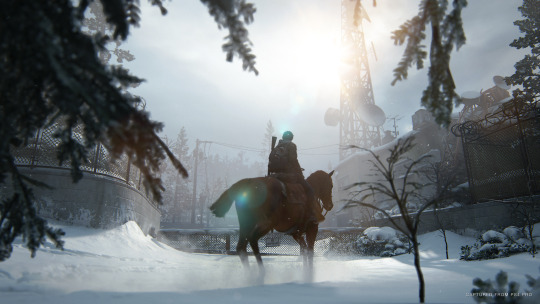
So if we’re following the original story of Dinah, the first thing that would happen is that Ellie and Dina head out on patrol the night after their kiss. Obviously this would mostly serve as a tutorial-like introduction, but it would also serve as the setup for the rest of the game. This is where the basement scene comes in, in which both of them are attacked and/or assaulted, and for whatever reason, they take Dina and Ellie escapes.
A lot of people have been speculating that the game revolves around the sole idea of revenge, and while Ellie’s clearly pretty jazzed off about whatever happened in the gameplay and release date trailers, it’s likely more of a “side quest” aside from her actual goal: to get Dina back. Naughty Dog games in the past, including The Last of Us, have always had a certain goal in mind that you’re working towards throughout the game. This also aligns with the story of Dinah, as she isn’t killed, but taken.
In addition to the supporting story, much of the leaked footage aligns with this, as well. For example, in the leaked gameplay in which Ellie wakes up bruised and beaten in a theater and calls out for Dina and Jesse, but why would Dina be there? If Ellie’s main goal is to get revenge on the group who wronged them, then neither Dina nor Jesse being there would make a whole lot of sense unless they all just want to have one big traumatic experience together; however, if Dina was taken, it would make sense as to why Ellie and Jesse would go after her, because they both have strong feelings for her, want to get her back, and want to seek vengeance. At the same time, by the cuts and bruises littering Ellie’s back, we can see that something clearly went down very recently, which was likely the rescue of Dina. We can also confirm that this wasn’t a dream or some wacky acid trip, too, because in the leaked screenshot we can see Ellie and Dina exploring Capitol Hill in Seattle together.
Now of course we all want to know that Ellie and Dina live happily ever-after, and this might (?) be true according to the story of Dinah, in which both of the brothers (represented here by Ellie and Jesse) return safely home with Dinah. Since this is where the story ends, is this where the game takes a twist? Possibly, but we’ll never know for sure until we play it.
II. Whodunnit?
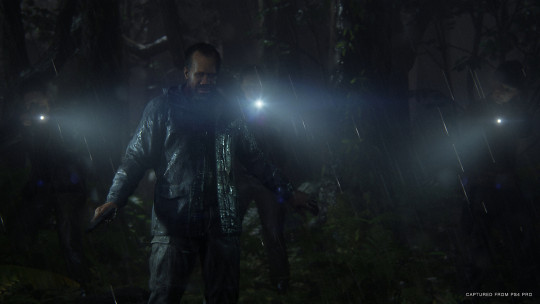
Alright, so I’m gonna break this down into the two groups that are confirmed to be in The Last of Us 2: the Seraphites and the WLF. Though none of this is stemmed from the story of Dinah, the biblical meanings behind their names matched up pretty darn well with what we know about them already.
Now, the thing is, after trying to look up the Hebrew origination of the word “seraphite”, I found that it wasn’t actually a word at all. What I did find, however, was the definition of the word “seraph” which is “of the highest order of the nine-fold celestial hierarchy, associated with light, ardor, and purity”, with another description being a “six-winged angel”. The Latin suffix, “-ite”, means to be a follower. In other words, the Seraphites see themselves as either messengers or followers of god. This description makes a lot of sense, as in the trailer with the mystery-woman, the Seraphites say to “clip her wings” in reference to Yara.
When it comes to the WLF, the meaning behind their name is much more simple. As we can recall from the gameplay trailer, we hear the Seraphites shout out “WOLF!”. In addition to this, poster released shortly after the mystery-woman trailer portrays a wolf shaped by flames. Thus, I decided to look up the biblical meaning of a wolf, as the two groups are likely at odds. Unsurprisingly, the term “wolf” is generally used to describe those who pray on the weak.
After looking at these two groups, I concluded that the culprit is ultimately the WLF for a few reasons:
1. The meaning of the wolf in a biblical context (which was first mentioned to describe one of Dinah’s other brothers, by the way)
2. In the release date trailer, we can definitely see the attire of those who attacked the two. They’re wearing jackets; the man who initially attacked Ellie is wearing a cap. If we look at the gameplay trailer, the Seraphites distinctly wear robes, and so they are likely out of the question.
3. In the release date trailer, Tommy says “you don’t know how large that group is; how armed” all the while displaying a group of men with guns, and one verrrryyy important dude that I haven’t really seen a lot of people talking about. And that is this guy:

OK, I know, it doesn’t seem like that big of a revelation but take a look at this guy’s face, and then scroll back up to the beginning of this section. Look similar? They’ve got the same hair, skin tone, attire, etc. In addition, the people with guns in the photo also have similar attire and weaponry to those in the release date trailer. At the same time, in the basement scene, we can also see a man in similar attire and a similar skin tone holding Ellie down (though to be fair, we can’t see his face, and so this may not be the same guy, but the attire definitely separates them from the Seraphites).
Did maybe the Seraphites get a lil’ chilly and decide to wear jackets if the attacked Ellie and Dina? Maybe, but my bet’s on the WLF.
III. Patching Up the Plotholes

Alright, so this theory definitely leaves a couple of plotholes that I wanna possibly cover (though it should be noted that these are speculation):
1. As we see multiple times in both the screenshots and gameplay, Ellie entered Seattle alone. Where did Jesse come in?
2. Joel is in multiple screenshots, and also talks to Ellie in the release date trailer. What does he got to do with this?
So first of all, answering the question of where Jesse came in is fairly easy to answer, and it’s that he followed Ellie. As seen in the release date trailer, about a handful of people in Jackson left to go out on patrol other than Ellie and Dina, one of them being Jesse. Given the incident that happened in the basement, I’m guessing Ellie didn’t decide to keep scavenging for supplies and returned to Jackson early in order to recover and spread the news, which means Jesse likely wouldn’t have been back yet, and didn’t hear the news and go after Dina until he returned to Jackson. Then the question of the change in seasons comes into play. If this theory is true, I’m guessing that the basement scene took place near the end of winter, while Ellie/Jesse going to Seattle took place in early Spring, or that Ellie/Jesse left as soon as possible and the journey took longer than expected due to multiple obstacles like what happened in the first game.
Now, when it comes to Joel, I returned specifically to the story of Dinah. A while after the incident, when Jacob (the father of both Dinah and the brothers) is blessing his children, he expresses his disappointment in the two brothers as “in their anger they slew men” and “cursed be their anger, for it was fierce, and their wrath, for it was cruel”. Based on this, I believe that the multiple screenshots from the game are in the context of Joel expressing his disappointment in Ellie, as she likely went out of her way to kill more people than she had to in order to get to Dina. This also correlates to the reveal trailer in which Joel says “you really gonna go through with this?” and Ellie replies, “I’m gonna find, and I’m gonna kill, every last one of them”.
~Conclusion~
Alrighty, so that’s pretty much it. Again, I don’t know if a lot of the biblical stuff is accurate since I wasn’t raised in a strictly Jewish nor Christian household, but I was intrigued by some interpretations and frankly I really wanted to get this out and see what everyone else thought about it. Please, if you have any additional thoughts about this, correct something I said, or point out any other plotholes, leave a comment! I’m in desperate need for some TLOU2 action.
#the last of us#the last of us part 2#the last of us part two#the last of us ii#tlou#tlou2#tlou ii#tlou ellie#tlou dina#tlou joel#tloup2#ellie x dina#ellie and dina#ellie williams#Ellie Miller#gaming#game theory#theories#video games#i'm so bored someone save me#my head is going to explode#dina is a top#ellie is a bottom#monty don't @ me
66 notes
·
View notes
Text
Dark Templar's name symbolism
Aka why Ai is the perfect example of a knight templar
So in addition to being absolutely obsessed with Ai I am also obsessed with Ai’s deck because holy shit is that deck loaded with symbolism it’s beautiful really but the card I’m the most obsessed with is Dark Templar cause duh of course I am it looks very very similar to Decode Talked, Yusaku’s subace (Firewall Dragon is Yusa’s ace I don’t care what Konami says and this is the hill I will die on) because of course it does and its effect is similar yet opposite of Decode Talker except instead of protecting it revives but like its name (specifically its adaptation name change) is what really interested me
At first I thought it was lame that DT’s japanese name was Dark Knight while its english name is Dark Templar like Dark Knight was pretty much the perfect summary to ais character development (character reveal?) so why would they change it to Dark Templar? (aside from being pieces of shits but let’s assume they had a thematic reason) I got bored enough to find out Google essentially defines a templar as a religious knight which I thought was odd but aight an acceptable name change but then but then I came across the knight templar trope while reading through Yubel’s trope page on tv tropes (I was looking for those elusive Jewish wedding/Jaden vs Yubel fusion duel parallels if you can provide them hit me up pls) and oh boy did that trope change the game
I’m just going to list the defining characteristics of knight templar straight from the page because holy fucking shit Ai portrays this trope to a t
“Usually, the Knight Templar's primary step (or objective) to their perceived "utopia" is to get rid of that pesky "free will" thing that is the cause of crime and evil.”
If Ai would have won that duel against Yusaku he would have gotten rid of his free will by scattering it thus dying in the process while utopia wasn’t Ai’s endgame Ai’s existence would have led to a dystopia and preventing that is Ai’s endgame goal
Many Knight Templars are utterly merciless in dealing with those whom they consider evil, and are prone to consider all crimes to be equal.
While Ai didn’t believe that everyone else was evil (save for Queen but he’s not wrong) he did erase those who tried to stand in his way and that’s pretty much what a knight templar does in face he doesn’t erase Aoi instead forcing her to suffer the same fate he has all because she teamed up with Akira to stop him from getting the second sol key (disproportionate punishment to crime)
It's important to note that despite being villainous within the context of the story, Knight Templars fully believe that they are on the side of righteousness and draw strength from it and that their opponents are not. Trying to reason with one isn't much good either, ...
While Ai isn’t a villain he is very much the antagonist of s3 (remember kids villains and antagonists aren’t the same!) and he absolutely could not be reasoned with because he believes that what he’s doing is for Yusaku’s best interest (a trait he shares with Yubel who is definitely a knight templar don’t get me started on the whole fusion thing) of course this doesn’t get revealed until much later on and it’s even revealed that he was doing this mainly to save Yusaku’s life so he definitely drew strength from his motivation
Indeed, it may take them a while to realize that a person with sense and good will really opposes them ...
He knew Yusaku would oppose him (while this doesn’t fit to a t his antagonism was an act so that he could get Yusaku to kill him or commit a homocide/suicide (sorry couldnt’ resist)) hence why I believe his extreme actions was an attempt to goad Yusa into chasing after him so Yusa would end up dueling him and thus forcing him to pick how he dies
One of the few ways to actually change a Knight Templar's mind is to kick their ass down to the ground. ... They won't necessarily join you ...
While this part again doesn’t exactly fit Ai to a t these parts do at least to fact that Ai didn’t reveal the entire truth until Yusa beats him and quite literally knocks Ai down and out (gotta love high stakes children card games) even then Ai still doesn’t try to listen to Yusa’s desires (granted he couldn’t have even if he did wanted to) interesting to note that tvtropes says they’ll probably listen to your story when in this case Yusa listened to Ai’s story and this was sprinkled throughout their duel getting progressively worst as the duel continued
The Knight Templar is often the ultimate incarnation of Light Is Not Good, and in series where Dark Is Not Evil ... If they are still nominally good, expect them to be a Hero Antagonist.
I disregarded everything that didn’t apply to Ai in between these two statements because Ai himself is the dark aspect of the series something he shares with Yusa and obviously he doesn’t believe Yusa and himself to be evil especially Yusa since you know he knows Yusa is actually a good person I included this because Ai was very much originally a hero turned antagonist and this is yugioh it’s the embodiment of light bad dark good (if memory serves me right 5ds is the only series to not follow this trope)
Sometimes, the Knight Templar is an artificially intelligent computer that took its instructions to "protect humanity" a bit too far
I couldn’t resist this was the plot to s3 in a nutshell
... Knight Templars will insist that they're good guys, even the ones that are practically villains, they often aren't completely ignorant of the pain they cause; they simply consider it to be acceptable collateral damage, or regret the means they "must" use to achieve their ends
In this case Ai had noble intentions but insisted on portraying himself as a villain and he expressed regret at having dragged Roboppi with him and causing Roboppi’s demise (sobs)
Given how well Ai suits this trope (it’s almost every single one of their defining features) it’s no wonder that his symbolic monster counterpart is known as both Dark Knight and Dark Templar with Dark being the common element in its name change cause goddang
I lowkey want to do an in depth analysis on Ai’s deck and how they fare against Yusaku’s code talkers cause there has to be a connection but I’m lazy and that requires so much research
#im running on 4 hours of sleep#i literally fell asleep and woke up to thoughts of dark templar#i might have a problem#its okay tho#dark templar @ignister#yugioh vrains#ai vrains#ais deck#apparently i need a meta tag now#ais deck analysis#ygo vrains
23 notes
·
View notes
Note
I was scrolling to your blog, as I often do, and I just saw the pewdiepie post and it just seems so absurd to me. I saw the article says he makes fun of corona in "racially edgy" video, so I went back to it to see if I had missed something, and it just, it's the most sensationalist way of describing it? Like, there's nothing racial about it besides him talking about his visit to japan and speaking chinese (or japanese maybe?) (Cont...)
And then the making fun of corona is just him telling the virus off because he seriously thought he was going to die while in japan (which, understandable since it was one of the first countries to be affected by it and we all thought we were going to die back then). So people calling him a neo-nazi is just so weird to me and I truly believe people who think that haven't watched his videos and just go along with what those articles say about him (cont...)
He's not a saint but I don't think he's racist or isn't trying to radicalize kids in any way??? Those claims just seem so over the top to me, it baffles me when I see those articles
///
Hey anon. So, fair disclaimer, I haven’t seen any of his videos and I am basing my judgments from secondary articles. (I honestly don’t really want to give him any views and I am not interested in his content in any way). I reblogged this post mostly because of the last addition - about how radicalization can happen in a very subtle way at first through humor.
That said, I have been reading things about this dude having an extremely dodgy sense of humor for years. No matter how you try to explain it, for instance, paying two Indian men to hold up a sign that reads “Death to All Jews”, wearing a swastika to work, yelling the N-slur during a livestream or recommending an anti-Semitic channel is just bad - even if he didn’t ‘really mean it’. Then there is the matter of the New Zealand white nationalist Christchurch mass shooter going “Subscribe to PewDiePie” and it becoming a sort of meme in online far right spheres.
As explained in this New York Times interview, there is a possibility the dude was engaging in some edgelord humor, just picking the most offensive possible subjects to joke about for fun and popularity - a possibility that deep down ‘he’s not really racist.’ But there is the matter of personally held beliefs, and then there is the impact of your actions. Being a racist is not only about your personal convictions, but also about your behavior. Structural oppression works in a way where no matter what your own beliefs are, you can still participate in it through your actions. I would argue that making those sorts of jokes, even if you ‘don’t really mean it’, contributes to that pattern of oppression. Humor is often a way to maintain the social status quo by indicating whose pain is ok to laugh about, whose concerns are ok to dismiss and ridiculize. Humor as a microagression jokes about ‘small things’ that actually hit on a much older, much larger pain and history of oppression. It can be used as a dogwhistle to express that the one making the joke doesn’t consider the people he jokes about fully human - or not ! because it’s just a joke, relax ! but the introduction of that fear is exactly the point.
I’m French - a big part of our humor is ‘second degré’ and pretending to hold offensive views. When done well and with delicacy, it can be brilliant, a great way to demonstrate the absurdity of those views and a very important part of media literacy, teaching people not to take everything at face value. But the sad truth is, most often,there is no subtlety, no context and no accompanying self-deprecation, no flippping of the laughing object from the subject of the views to the one holding those views - most often it’s Shrodinger’s threat. It’s a way for bullies to get away scot free because ‘it was all a joke’ and ‘you shouldn’t take it so seriously’ - laughing not at the bigot but the one who was reminded of his oppression. Anti-semitism in particular has a history of being dismissed because of dangerous clichés about Jewish people secretely holding a lot of power/wealth over others. I think PewDiePie has both a lack of subtlety and an enormous platform and the mixture of the two seems extremely dangerous to me.
Then there is the additional context of the rise of the alt-right on the Internet - like that post explained, there has been a deliberate strategy from Neo-Nazis to start with jokes to slowly acclimatize people to their views.
As said here “White-nationalist and alt-right groups use jokes and memes as a way to normalize bigotry while still maintaining plausible deniabiliy, and it works very well as a recruitment strategy for young people.”
As this mother who saw her teenage son radicalized by the alt-right explains, the innocuous aspect of the jokes at first is precisely the point. Young people (most often boys) who don’t have the levels of critical thinking and nuance required to understand systemic aspects of oppression, engage with and spread the content because it’s ‘just jokes’. Then, when people get hurt and pissed at them for it, it makes them angry - at women, at gay people, at people of color, at Jewish people, at ‘liberal snowflakes’ for being ‘too sensitive’. They feel attacked ‘for nothing’ and misunderstood, which primes them to being recruited by extremists as the jokes become darker and darker until they’re not jokes at all anymore.
To go back to PewDiePie - I don’t think he was a Neo-Nazi all along, I think he was just an idiot with an edgy sense of humor who was given too much attention. But it remains that he contributed to a certain online climate and he was instrumentalized by the far right. At best, he is just massively clueless, and his efforts to distance himself from his impact seem oddly half-hearted, as are his claims that he just ‘isn’t into politics’. The world is political, and when you have that big of a platform, you have to be considerate about the impact of your message, no matter what your intentions are. Trying to claim neutrality is a massive mark of privilege, and his whole behavior is just incredibly irresponsible.
I’m not saying that anyone watching his content is secretely a bigot or a Neo-Nazi. And maybe he has gotten more self aware since then. But he has more than earned people’s mistrust, and people seeing racism in his videos doesn’t spring out of nowhere.
3 notes
·
View notes
Text
Hi! So I was one of the anons who was asking a writing question on this blog. In light of one of the other asks that suggested gentiles use more detail when approaching this blog as a writing resource, I’m going to resubmit my question with additional context. I know a lot of people rely on this blog and I don’t want to take up too much time.
So, the question I asked was about other gods and Jewish characters interacting with them, and I used Mara (fictional) and Hestia (Hellenic) as examples. I believe I mentioned blessings as well, although I was oversimplifying to save on room to fit in one ask, and after laying everything out I can see where I really didn’t do the respondents any favors by doing so given this is a bit of a nuanced question with a lot of context.
Mod here. I’m interrupting to thank you for the level of detail and for being willing to come off anon. Submission continued under the cut for those who are interested.
The character in question is Tim Drake/Robin/Red Robin from DC Comics, who hasn’t been confirmed as canonically Jewish, but his definitive writer, Chuck Dixon, has gone on record as stating he considered Tim a Jewish character, although as far as I know there haven’t been many, if any, hints that Judaism plays any meaningful role in Tim’s life. I want to push back against this as part of Tim’s character arc, which was left uncompleted after the DC-wide continuity reboot, and show him settling more into an explicitly Jewish identity, especially since his father figure/mentor Bruce Wayne/Batman is canonically Jewish, although DC has ignored that ever since they accidentally canonized it.
Now, the DCU, as any comic universe is aught to be, is filled with cosmic entities and gods and monsters of all sorts. The specific one I’m thinking of here is Scott Free, or Mister Miracle, who was created by a Jewish man named Jacob Kutzberg, better known as Jack Kirby, as part of his Fourth World Saga. Scott Free, and most of the characters in the Fourth World, are referred to as “New Gods” who have taken the place of the “Old Gods” after they died. Kurtzberg never finished the Fourth World Saga, so his intentions as to what that means are unknown. Complicating things further, the Hellenic/Norse gods are very much alive and well in the DCU.
We have no futher explanation - at least, not from Kurtzberg- of what exactly it means to be a New God, and the only one who is ever shown to be worshipped is the evil Darkseid of Apokalips, who is the antagonist of the Fourth World and some would argue the entire DCU, who seeks to eradicate free will and forces his subjects to worship him as his master. As far as I know, no DC character has ever prayed to any New God.
As for Scott, he is the DCU’s greatest escape artist, bar none. His talents were honed through his many escape attempts on Apokalips, until he finally succeeded in escaping Apokalips in defiance of Darkseid’s will, choosing to run away from Apokalips rather than serve under Darkseid’s regime as a warrior. He now lives on earth with his wife and his adopted son Shilo Norman and uses his talents as an escape artist to perform for the public. He also serves as a member of the Justice League with his wife, Big Barda, also a New God and an ex-general of Darkseid’s. He and Barda are the only ones who have ever escaped Apokalips and Darkseid’s wrath.
Shilo has a point in the comics where he becomes Mister Miracle for a short time and is one of the more metaphysical takes on the Mister Miracle character. He’s the one who is mainly referred to as the Avatar of Freedom as far as I can tell, has escaped death itself and has received some sort of true sight ability from one of the other New Gods (Metron) during his time as Mister Miracle. Shilo, in addition to being Black, is shown consulting a rabbi during his time as Mister Miracle, though I don’t think they allow Shilo’s Jewishness to have any effect on the story or Shilo’s characterization.
In the original Kirby run, a lot of Scott’s escapes depend on the technology of the New Gods, which is also somewhat magical in nature. Newer interpretations of Scott emphasize the innate nature of his escape artistry, with some even having Scott able to escape death whether he wants to or not, though most of those seem to be influenced by Shilo’s run as Mister Miracle and not the other way around (given the pre-mentioned continuity reboot)
In my story, Tim goes to Scott looking for help finding Bruce because of Scott’s connection to Darkseid, who caused Bruce’s “death.” Along the way, Tim will get some training in escape artistry and combat from Scott, Barda and Shilo. There’s other complicated character stuff going on, but the important part is that Scott, Barda and Shilo are going to come to view Tim as a part of their family.
The question I have kinda depends on how Scott being a “New God” is interpreted, and on the effect his tutelage might have on Tim and Shilo as normal humans. As Shilo was shown consulting a rabbi, I think it’s safe to say he has some level of observance, even if his FOR is never made clear. Tim is a far more ambiguous matter, and Tim’s the character i’m going to be following in later stories- one of the projects I’m writing now is set after his training with Scott.
Tim’s definitely not going to recieve a direct blessing from Scott or anything like that. Specifically what I’m thinking is that when it comes to escaping, Tim’s a bit luckier than maybe he should be- a cracked link in a set of handcuffs that snap with a little pressure that don’t snap for someone else, for instance, or a guard whose eyes linger in the wrong direction just long enough for him to slip by. Little bits of accumulated luck. It’s not at all an idea I’m married to, but I thought it would be a neat detail to work in.
The TLDR is, it seems to me like there should be some metaphysical effects of being the protogee/the adopted son of a New God, depending on how you interpret the nature of a “New God” Is it possible to respectfully approach the idea of Scott and Barda being New Gods and the effect that might have on two mortal Jewish people, especially where Shilo is concerned?
Thank you all so much for your time.
Mod here
#writing#Jewish characters#writing jewish characters#opinion#advice#Judaism and polytheism#submission
3 notes
·
View notes
Note
Hey, I saw your post about stopping teenage boys from making racist jokes and I was wondering how I could get my brother to stop. He's 13 and I'm 16 and I don't think he cares about what I think of him all that much. How can I get him to stop?
A few points of clarity here. When I made my addition before reblogging that post, I had no idea what kind of traction it was going to get or how far past the handful of people I interacted with it was going to go. Had I known those things, I would have phrased things different, added the additional context I added in a later reblog, or, most likely, not added my own commentary at all.
Other relevant bits for my situation. I was, in these contexts, the only adult in the room, I was very new to the whole “being an adult” thing, I had no formal training as an educator and much of what was being said was actively harmful to other children present who were also my responsibility. Some of those points are still applicable. Furthermore, I am one stranger on the internet, I do not know you, your brother, or child psychology, and you should not take my advice as gospel.
My goal in “shut down the racist/sexist crap” was not “change this child’s mind” it was “there are other children who are legitimately threatened by some of what is being said who should not be subjected to the discussion of why this behavior is inappropriate because they live it.” I also note in that post that I already had a working relationship as mentor-figure with the kids who listened. That’s important, but that relationship has to be allowed to develop organically and not with the goal of “eventually mold the child.” These were kids who liked and looked up to me not because I wanted them to but because I treated them respectfully and we did not have extreme conflicts of personality. You’re a kid yourself. I hope, for your sake, that there are adults in your life who are good at establishing that kind of relationship (additional note, I am using ‘relationship’ in this post exclusively in the “general pattern of interactions between two people” sense), but in case they aren’t, I’m going to touch on that in here too.
The last thing I had going for me was that every single one of these boys 1) did not actually believe most of the crap he was spouting 2) really did want approval and attention from an authority figure and 3) was saying it to fit in with other children who routinely threw similar back at him and were not present. (Relevant context there, these incidents were primarily in a Jewish education environment.) I also had the advantage of being able to pull the kid aside after the fact and essentially have a “dude, what gives, I’m not going to call you out in class but where is all that coming from” talk.
So, with context out of the way, advice as relating to your brother: the short answer is that “you can’t.” At least not if the goal is just “make him stop” on its own and you two aren’t friends and he doesn’t look up to you in any capacity. Elephant in the room first: if he actually believes what he’s saying, that’s out of your paygrade; that’s when you rope in your applicable trusted grownups and contact an organization like Life After Hate for advice. The rest of this post is written with the assumption that he probably doesn’t believe most of the bigoted things he says but he’s either learned that saying them gets responses or just picked them up somewhere and never thought about it. No matter what, if you’re the only person in his life saying “that’s not acceptable”, you are fighting an uphill battle. It might well be a hill worth dying on, but it won’t be easy.
The long answer is: “does he have a reason to care about what you think”. Is your relationship with him generally positive? Negative? Neutral? Do you just kind of inhabit the same space and not interact? Based on the relationship you currently have, do you see the two of you still being in touch of your own volition and not because other relative demand it once you’re both adults and not living together? It’s perfectly fine to say “nah, we’re not close and we’ll probably go our separate ways once we can”. That is a thing that happens sometimes and it is not inherently a question of fault or blame. But if you’d rather not have that happen, if he’s generally someone you like being around who just... sometimes says out of line crap that you don’t want to hear or is annoying or... I dunno, eats the leftovers you were saving, then focus on your relationship with him, not a one-way thing where you try to fix his behavior and he ignores you for being annoying.
Things kids should hear, when appropriate, from older people in their lives: “I’m sorry.” “You were right and I wasn’t, it’s [XYZ].” “Can you tell me more about/explain [thing kid is interested in that older person knows less about].” “Y’know, I haven’t considered that before.” “Good idea.” “Well done.” “I’m proud of you.” “Please.” “Thank you.” “That’s a good question.” And those things should be said sincerely -and without making a big deal of them. In other words, kids need to be treated like people. Y’all deserve to have your feelings acknowledged. You know adults aren’t perfect. You know we screw up. It does you and us no favors to pretend otherwise most of the time. (Disclaimer: I have never worked with children under the age of six, and even my experience with kids that young is limited. I don’t know if it’s actually good for preschoolers to pretend adults are infallible.) You deserve encouragement, not just criticism, and you deserve to have your effort acknowledged, even when you fail. And here’s the thing: if your relationship with someone is an entirely unilateral thing where they list off what’s wrong about you and you are expected to sit there and take it, eventually, they will snap. They might snap towards anger and they might snap towards anxiety and they might snap in some other way entirely, but it is not sustainable in the long-term.
So with all of that in mind, the actual answer? “Put that aside for now and focus on being a reliable friend-figure to your brother, if that (the relationship) is actually a thing you want.” Spend a bit more time together (or less if you two are stuck with waaaaay too much family time right now). Ask him about a hobby or interest of his that you don’t share. Ask to join him with one you do. If he thinks your friends are generally cool and it’s just that you, personally, have sibling-ick, include him periodically when y’all do stuff. You don’t have the authority to just make him stop doing objectionable things. More importantly, as another child in his life, that’s not your job. Down the road, if you’ve got a working relationship going and he says something bigoted, you can ask -and I do mean ask (as in, as sincerely and non-judgmentally as you can) -where he got that from/why he says it/if he believes it and then listen to his answer and let the conversation flow from there. And that conversation is hard, and that conversation is scary and the first time I had it as the adult, I had a shitload of internal panic of “oh god what if I say the wrong thing” going on that I very carefully did not express because that was my problem, not the kid’s, and at that point the kid needed a grown-up to listen to what was going on in his life and I was the one who’d gotten picked. But there’s no easy mute button in real life. (Fact.) Authoritarian “because I said so” is usually not going to work and tends to backfire. (Opinion.)
2 notes
·
View notes
Link
"I cannot be anti-Semitic alone."
That's the declaration captured on video of a performer at last month's Conflict Over Gaza conference, an event held at University of North Carolina-Chapel Hill and co-sponsored by several UNC entities and departments, including the Chancellor's Global Education Fund.
"Let's try it together," rapper Tamer Nafar tells the audience before his performance, inviting them to sing. "I need your help. I cannot be anti-Semitic alone."
"Don't think of Rihanna when you sing this, don't think of Beyonce - think of Mel Gibson. I'm in love with a Jew/Oh/I fell in love with a Jew/Oh/Her skin is white and my skin is brown, she was going up up and I was going down."
The raw video was taken by filmmaker Ami Horowitz and shared exclusively with the ABC11 I-Team. Horowitz, based in New York, posted that clip and other anti-Semitic exchanges he said he experienced while visiting the campus the weekend of March 22 on his YouTube page.
"I heard there was a conference going on about the conflict in Gaza, and my initial assumption was that it was going to be a hate fest against Israel," Horowitz tells ABC11. "When I went there, that is what I found, but what I did not expect was for it to evolve into open anti-Semitism."
"You expect these attitudes from Neo-Nazis and white nationalists, but you don't expect these attitudes in the halls of academia and the halls of Congress," he said.
The conference, titled Conflict Over Gaza: People, Politics and Possibilities, was officially sponsored by the UNC Center for Middle East and Islamic Studies and the Duke-UNC Consortium for Middle East Studies. The event's website lists more than 30 co-sponsors ranging from UNC School of Law to the Rotary Club of Raleigh.
The three-day event's description explains that the conference "will shed much-needed light on the current realities in the Gaza Strip, giving participants a deeper understanding of the context of these realities and offering concrete options that can better the lives of Gazans. The conference also highlights Gazan culture-music, films, food, and art-to showcase the beauty that goes along with the challenges of life in the Gaza Strip."
The Duke-UNC Consortium for Middle East Studies, moreover, says on its website that it "supports events that increase awareness of the history and cultures of the Middle East and Muslim civilizations, and values diverse perspectives that promote dialogue and understanding. Events listed here originate from a variety of campus units and community organizations. The listing of an event does not constitute endorsement of or agreement with the views presented therein."
...ABC11 reached out to UNC about the conference. Citing Horowitz's YouTube video, UNC Global sent the following statement: This video was produced by an individual who attended the "Conflict over Gaza" conference and recorded discussions with a number of attendees who were unaware he was taping their statements. The content was heavily edited, and the product as presented does not provide context as to the questions and the full, complete answers given. Moreover, we do not believe this video represents the spirit of scholarship at the event.
The conference brought together internationally recognized scholars and professionals from NGOs, think tanks, and academia to address a range of topics about Gaza from different viewpoints. The sponsors supported the event as an educational opportunity, and this video misconstrued the breadth of discourse that took place during the panels.
Our University is united by students, faculty, and staff from more than one hundred countries and represented by a diverse range of perspectives, traditions, and faiths. Diversity is an intrinsically vital part of shaping dialogue that can address complex issues, and we uphold a commitment to fostering a welcoming environment to people from all backgrounds.
Conferences such as this are organized by scholars who have academic freedom to develop the programming and invite their selected speakers and performers. UNC Global supports faculty in hosting these conferences without endorsing the beliefs of speakers or performers.
ABC11 again reached out to UNC Global, sending them the raw, unedited version of the performance. The organization referred ABC11 back to the original statement, with emphasis on the final paragraph.
Late Thursday evening, Duke sent a response to ABC11.
"We want to be very clear: antisemitism is one of the great scourges of modern life. Its resurgence, as demonstrated by the worldwide increase in hate crimes and incidents, is deeply troubling and should be of great concern to any civil society," said a joint statement from Duke University President Vincent E. Price and Provost Sally Kornbluth. "Whether it occurs on our campus, in our community, through graffiti, rallies or concerts, in conference rooms or courtrooms, we must all speak out forcefully against actions and statements that target and threaten members of our Jewish community. On our campus and beyond, the lines of politics, trust, activism and civility cannot become so blurred that we lose our commitment to mutual respect. We must guard against the danger that our passions obscure our common humanity, and we must remind ourselves that what injures any one of us injures us all."
On Friday, UNC Interim Chancellor Kevin M. Guskiewicz issued the following statement: A performance during a recent conference held on our campus contained disturbing and hateful language. Like many members of our community, I am heartbroken and deeply offended that this performance happened. I stand steadfast against Anti-Semitism and hate in all its forms. The Carolina spirit is not about hateful language that divides us, but about civil discourse that advances ideas and knowledge. We must continue to aspire together to that ideal.
Several members of the Triangle's Jewish Community sent letters to both UNC and Duke leaders critical of the conference and its roster of speakers.
In a letter posted online, Hillel North Carolina writes:
"North Carolina Hillel is disappointed that the Duke-UNC Consortium for Middle East Studies' "Conflict Over Gaza" conference featured speakers who demonized Israel for the humanitarian crisis in Gaza and included too few perspectives from scholars who could have provided balanced context and multiple viewpoints on this challenging subject. Organizers missed the opportunity to convene a rich, educational forum that the UNC and Duke communities deserve."
Beth El Synagogue in Durham, meanwhile, wrote to administrators ahead of the event that "Beth El members have been troubled by the recent uptick in antisemitic acts which have occurred at Duke, UNC, and around the Durham-Chapel Hill area. In addition to this, while criticism of Israel is, of course, legitimate and important in a democratic society, portraying Israel only as an oppressor and Palestinians only as victims functions to demonize Israel, and neither leads to constructive dialogue nor advances rigorous academic thought."
...Unrelated to the conference, Guskiewicz on Wednesday alerted students and faculty that "university Libraries officials found several anti-Semitic posters on bookshelves and tables in Davis Library."
"I am extremely disappointed and appalled that anyone would write these abhorrent messages and direct them toward members of our Jewish community," Guzkiewicz added. "This behavior conflicts with the University's long-standing commitment to fostering an environment where all students, faculty and staff can be free from harassment."
Hillel North Carolina also wrote a letter to students that added more details to the posters: "The fliers include references to 'an evil Jewish plot,' and the missive, 'do everything you can to fight the silent covert Jewish attempt to enslave and kill good Americans.'"
275 notes
·
View notes
Text
WisCon 43 panel Learning to Hear the Dog Whistle
[Just wanted to say this was one of the panels I suggested and I’m so glad it went through and that I was able to make it to the panel. This is something so many of us need to work on, and I’ve made it a practice to point out when I think someone has unwittingly passed on a dog whistle-ish message, in large part because I hope/want for others to do the same for me when and if I do it, myself. Anyway, I learned a lot and this panel was really good.]
Political dog whistles are meant specifically to target one audience who agrees with you, and perhaps to trick others into agreeing with your subtle and covert language. It's important for us to be able to recognize these dog whistles, often used by racist, transphobic, and other bigoted groups. How do we learn to listen for and recognize these whistles when they are used specifically to dodge our ears?
Moderator: Heidi Waterhouse. Panelists: Seth Frost, Keffy R. M. Kehrli
Disclaimers: These are only the notes I was personally able to jot down on paper during the panel. I absolutely did not get everything, and may even have some things wrong. Corrections by panelists or other audience members always welcome. I name the mod and panelists because they are publicly listed, but will remove/change names if asked. I do not name audience members unless specifically asked by them to be named. If I mix up a pronouns or name spelling or anything else, please tell me and I’ll fix it!
Notes:
Heidi started the panel off saying that the panel was obviously not full of all kinds of representation (example: the panelists were all white), so they were going to miss some stuff. The hope was that they could impart more generally how to recognize dog whistles. [They also had a lot of audience additions later on]
She also said that when we talked about racism and antisemitism, etc. - we’re talking about a set of behaviors vs. individual people. She suggests giving someone a chance to walk back a dog whistle you’ve just heard them use and asking them if they know what they’ve just said.
Seth said he knows more white supremacy dog whistles than even he’s comfortable with, and he points them out whenever he sees them.
Keffy doesn’t know as many as he’d like, but he lives on social media and finds it important to recognize them whenever possible.
Heidi took a moment to define dog whistles - intentionally coded language meant to be covertly used within a group or community. For example: “interested in ethnic heritage” ~might~ mean someone is really into their Scottish heritage and actually eats haggis on purpose, but it also might mean they’re a white supremacist.
Seth used an example of a time the host of a TV show he was watching had a spider web tattoo on his elbow - without context he didn’t know if it meant the host just really thought spiders were cool or if he was a white supremacist. For context, Seth would have needed to see other tattoos, or what his political affiliations were, etc. Another example is Norse stuff, which can be totally innocuous, but is also something white supremacists are co-opting.
Keffy brought up seeing the number 88 on people’s user names - it might mean they were born in the year 1988, or it could be a white supremacist signifier.
Seth added that many Nazi’s are not smart. They use this “bullshit numerology” where 88 = HH = Hitler. However, 88 is also a lucky number in Chinese traditions, so that’s another example of something being used in multiple ways and not knowing without context how someone is using it.
Seth also talked about the 14 words - a white supremacist mission statement. So “14 words” or even just the number 14 can be a white supremacist dog whistle.
Heidi brought up the fact that we’re using dog whistle in it’s negative sense, but all in-group communities have their own language they use to recognize one another.
One example Heidi noticed was a show Forged in Fire about blacksmiths. A lot of them wore Thor stuff due to that connection, but slowly over time less and less of them continued to wear Thor-themed things as they’d had it pointed out to them how white supremacists were using those symbols.
Keffy talked about one way to notice if something is being used as a dog whistle or not is to pay attention to who shows up when you see it. When, for example, TERFs swarm to a post using specific language, it’s time to look up the terms used and understand how they’re being used.
Keffy explained what TERF meant, and used scare-quotes around “radical feminist” because he doesn’t see them as being particularly feminist or radical - especially not in the sense it was used in the 80′s. [yup]
Keffy also mentioned the use of pattern matching. If someone is using XX or XY in their bio - well, that’s not bad in and of itself, but if you take a moment to look at their page and you see them harassing a lot of trans people, then you have your answer.
Seth added that watching how they interact with others can be important. If you think they’ve used a dog whistle but aren’t sure, it’s okay to put some distance between you and them to just observe who they’re interacting with and how.
Keffy said it can be important to have friends from many different groups, and if someone tells you that something is harmful to them - listen and believe them. We often learn by being told after accidentally reblogging or retweeting something, and that’s okay. You just have to believe that people know better about their own oppressions.
Heidi talked about how bigots were using the triple parenthesis around names of Jewish people to mark them on twitter - some Jewish people and allies started to use the triple parenthesis for themselves intentionally as a sort of “I am Spartacus” protest. There was a big discussion about this in regards to reclaiming vs. causing harm due to generational trauma. It was important, in that instance, to listen to the Jewish people whose trauma was being triggered, and to believe them about not doing this.
Keffy added that he stopped retweeting as much from people who were using it because his followers had told him it was a trigger for them.
Seth said, as a Jew and trans person, “If I ask you to stop using a hurtful thing, that’s a big show of trust”, so he thinks about that when people come to him in a similar manner.
Heidi posed the question of having scripts for when we call out our friends, or when it’s time to ping an ally to help us out.
Keffy said he’s not that organized to have a script, but he does have some friends that he’s asked to take over. Gave an example of taking T and shifting pronouns, had a friend with a more masculine sounding voice call the pharmacy to ask about it first due to concerns about not being taken seriously.
Keffy also talked about the term calling in, rather than calling out, which is a more personal and quiet approach. He’ll usually DM someone or talk to them privately about these things - unless the discussion has already spiraled out in public.
Seth also said he doesn’t have a script for this, but in person he’ll usually just comment with something like “oh that’s gross” and if asked why, he’ll explain with as few words as possible.
Heidi agreed, saying that person is probably freaking out internally, and won’t hear a lengthy response anyway.
Keffy said no matter how long he’s been working on social justice stuff, when he’s called out/in, he still feels shame or defensiveness or both. It can take time to work through that, so expecting a full discussion right away might not be realistic.
Keffy also advised that if you ask an ally to do this for you, make sure they’re actually getting the right point across.
Heidi shifted the conversation to how to support people being targeted. The first step is to believe them when they tell you something. The point of these dog whistles is to seem like they aren’t a big deal, when they are.
Seth agreed, saying they throw just that much doubt about how they’re being used, so that people aren’t sure if it’s something bad or not. He advised defaulting to at least a base level of politeness when asked to stop using something - you can just stop.
Keffy gave an example of “drinking the kool-aid” to refer to something being cult-like. Keffy gave some background on the phrase coming from what happened in Jonestown. The leader was very abusive and he did dry runs of giving his followers laced drinks. They were punished and even killed if they didn’t drink it, which made it safer for them to assume it was fake again and to just drink it. Knowing all of this, we can see that no one was really consenting to drinking the laced drinks. Hundreds of people died, and their family members and loved ones can be very triggered by the callous and casual use of this phrase popping up in what seems like otherwise-innocuous instances.
Heidi gave another example - death marches. These kinds of phrases are used so commonly that we sometimes forget, or don’t even initially know, the history of them or the gravity of that history.
Seth talked about the trouble with hearing dog whistles when other people don’t. It can be very isolating to have other people saying “no I don’t hear anything.”
Heidi said a panel like this could easily become a “you’re not aware/angry/anxious enough” discussion, but really the world expands more when we learn more about it.
Seth talked about the main stream media often using antisemitic language that they may or may not be aware of, or mean. Examples: coastal elites, bankers. Keffy added that it’s gotten to the point where if he hears George Soros’s name brought up, he just stops listening. [RIGHT?!]
Heidi put it to the audience to give more dog whistle examples for us to be aware of.
One audience member talked about the “from (whichever city is nearest)” being code for black, poor, and violent. It was pointed out that Chicago is used as code for this nationwide.
Another audience member talked about Reagan’s “welfare queen” mythology that was put together on purpose and is still ongoing today.
Someone else in the audience asked how to tell if someone is trying to recruit you as an ally or just accidentally passing on a dog whistle they weren’t aware of.
Heidi advised looking for other clues in their language and interactions. Keffy added that this is why dog whistles are so insidious. The welfare queen myth became a meme that people began to believe in. So if you explain the history and context of it’s origins and watch how people respond to it - bigots often respond to these sorts of things by telling on themselves. You can tell in the reaction how they meant it once it’s pointed out to them.
An audience member gave another example - the peanut gallery. It has racist origins due to segregation - black people had to sit in the balconies and the myth was that they were unruly and tossing peanuts into the theater.
Another audience member talked about “urban” being used as code for black people in a negative sense. This audience member is a white teacher of mostly non-white students and urban can be used professionally as just a definition but she has to be careful about usage due to it’s other association.
Someone else in the audience talked about intelligence, but I missed most of what they said about it.
Keffy added on to that, by adding that IQ is just racist, and if it’s not being used to be racist, well then it’s still ableist so it’s still wrong. [good points]
An audience member talked about how eugenics is used as a dog whistle for “less intelligent people shouldn’t breed.”
Another audience member talked about gas stations and other places often owned by immigrants proudly displaying signs saying “American owned”. This is code for saying “this is the white gas station” for racists and xenophobes.
Someone else in the audience brought up the issue of faux dog whistles, such as the ok symbol. Another audience member replied that the problem is that they become associated with the bigotry anyway.
Seth added that everything is made up at some point or another.
Keffy expanded on that by saying the problem with “just for lulz” dog whistles is that this is how white supremacists recruit a lot of teens and young adults. It might not initially mean what it comes to mean, but it draws people in, which is the point of it.
An audience member brought up the dog whistles of merit, merit-based, and meritocracy - a commentary on reverse racism and affirmative action.
Keffy talked about commentary in science fiction genres about how there’s no more fun adventure stories because of all of these serious issues and social justice inclusion - codes for bigotry.
Heidi discussed ableism and how lots of times people just don’t know they’re using ableist language, but other times it’s done on purpose as gatekeeping. One example was putting “athletic” as what someone is looking for in a dating profile. Keffy added that you could do a whole panel on dog whistles in dating profiles.
Seth offered the example of people referencing Idiocracy as a dog whistle for eugenics.
An audience member brought up people talking about dueling accommodations - which is a real thing - but it’s often used to say that we shouldn’t even bother trying to accommodate people. Also gatekeeping through issues like service animals, claiming people aren’t “disabled enough” to use them, etc.
Keffy complained about things like signs saying “be healthy, use the stairs”.
An audience member talked about people casually claiming they have OCD or ADHD when it’s not true.
Heidi asked the panelists and audience to consider some transphobic dog whistles and gave the example “real women.”.
Seth said when people put “bio female” or “Webster’s dictionary defines womanhood as....” (which by the way isn’t even what Webster’s says but whatever).
Heidi talked about cis women even being attacked for seeming trans - both sides of the political spectrum tend to do this one.
Heidi also talked about fatphobia used in this way, such as making fat jokes about Trump - but that hurts all fat people.
Keffy brought up people who claim that cis is a slur.
I raised my hand from the audience to bring up people claiming queer is a slur as a way of excluding lots of groups beyond gay and lesbian, like trans people and asexual people. Keffy added that this is an effective dog whistle because it sounds social justice-y. Keffy also talked about “get the L out” - lesbians wanting their own group outside of the queer community.
Seth added the phrase “gender critical” as another one that sounds on the surface like a good thing, but is used by TERFs.
Keffy said they often tweak and claim terms that trans and non-binary people use to make fun of them or take power away from them.
An audience member brought up people using respect as a key-word to keep minorities from being angry and standing up for themselves.
Heidi brought up racist school dress codes, and asked people to add more dog whistles to the panel’s # - #HearTheDogWhistle. It’s a process to learn these things.
Seth closed by saying if someone tells you a thing is problematic - stop. Do some research. Even if it turns out you disagree with them in the end, it doesn’t hurt to stop and find out more. Respect other people.
1 note
·
View note